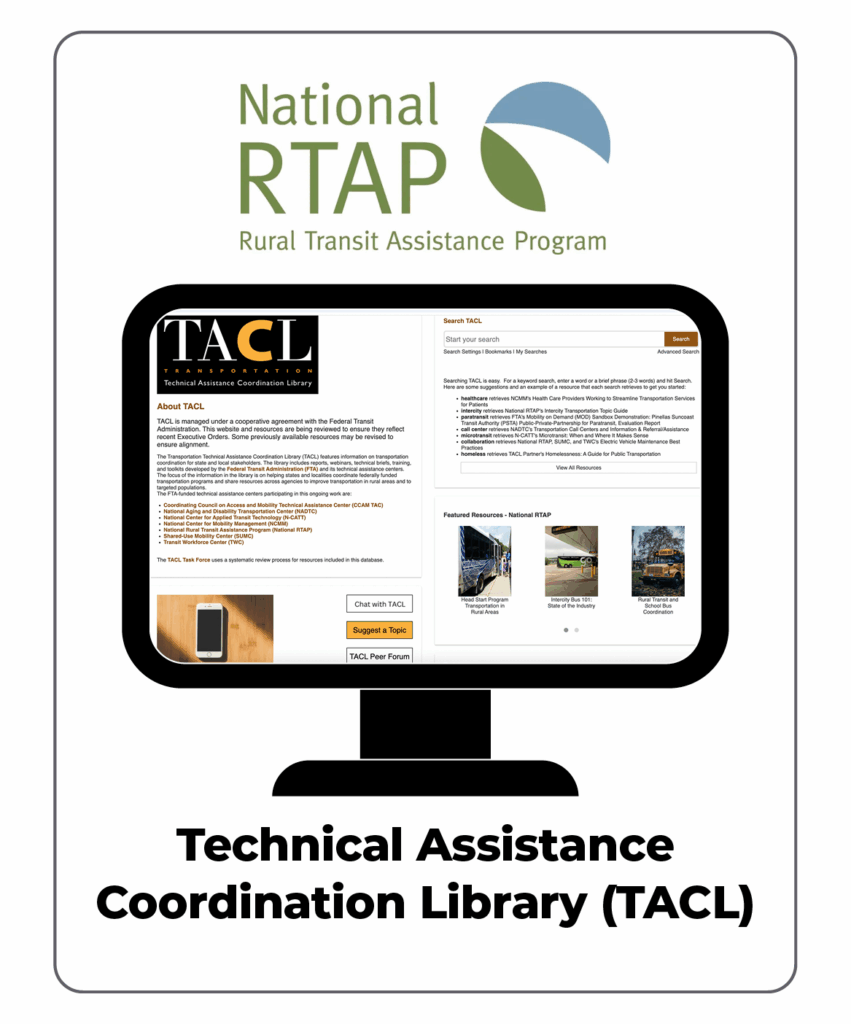
Technical Assistance Coordination Library (TACL)
National Rural Transit Assistance Program
TOPICS: Apprenticeship , Career Pathways , Community Engagement , Hiring and Recruitment , Labor-Management Partnerships , Low-No , Mentorship , Policy and Planning , Procurement , Program Evaluation and ROI , Retention , Safety and Health , Trainer and Mentor Development , Training , Workforce Shortage
Transportation Technical Assistance Coordination Library (TACL)
The Transportation Technical Assistance Coordination Library (TACL) provides a viable methodology and platform for access and findability of rural and tribal transit coordination resources across a broad range of transportation technical assistance centers and the Federal Transit Administration (FTA).
The FTA-funded Technical Assistance (TA) Centers participating in this ongoing work are:
- National Aging and Disability Transportation Center (NADTC)
- National Center for Applied Transit Technology (N-CATT)
- National Center for Mobility Management (NCMM)
- National Rural Transit Assistance Program (National RTAP)
- Shared Use Mobility Center (SUMC)
- Transit Workforce Center (TWC)
The TACL Task Force uses a systematic review process for resources included in the database. New resources will be added on a quarterly basis. Let us know if you would like to serve as a peer reviewer for our resources.
Why was TACL created?
The United States Government Accountability Office (GAO) published Public Transportation: Enhanced Federal Information Sharing on Coordination Could Improve Rural Transit Services in January 2020. GAO recommended that FTA “develop a communication plan that will effectively share information with state and local stakeholders on coordination opportunities in an accessible and informative way.” This effort was created to improve interagency resource coordination between FTA and its five TA Centers.
How can TACL be used?
TACL resources can be used to identify high quality technical assistance on transportation coordination. The resources can be used for research, training, practice, operations, planning, and other purposes. We encourage authors to cite TACL resources.
Ready to get started?
Visit http://transportation-tacl.org. Click on the Training tab at the top for instructions.
If you have a question about TACL, or if you would like to be considered to become a TACL peer reviewer, please contact info@nationalrtap.org
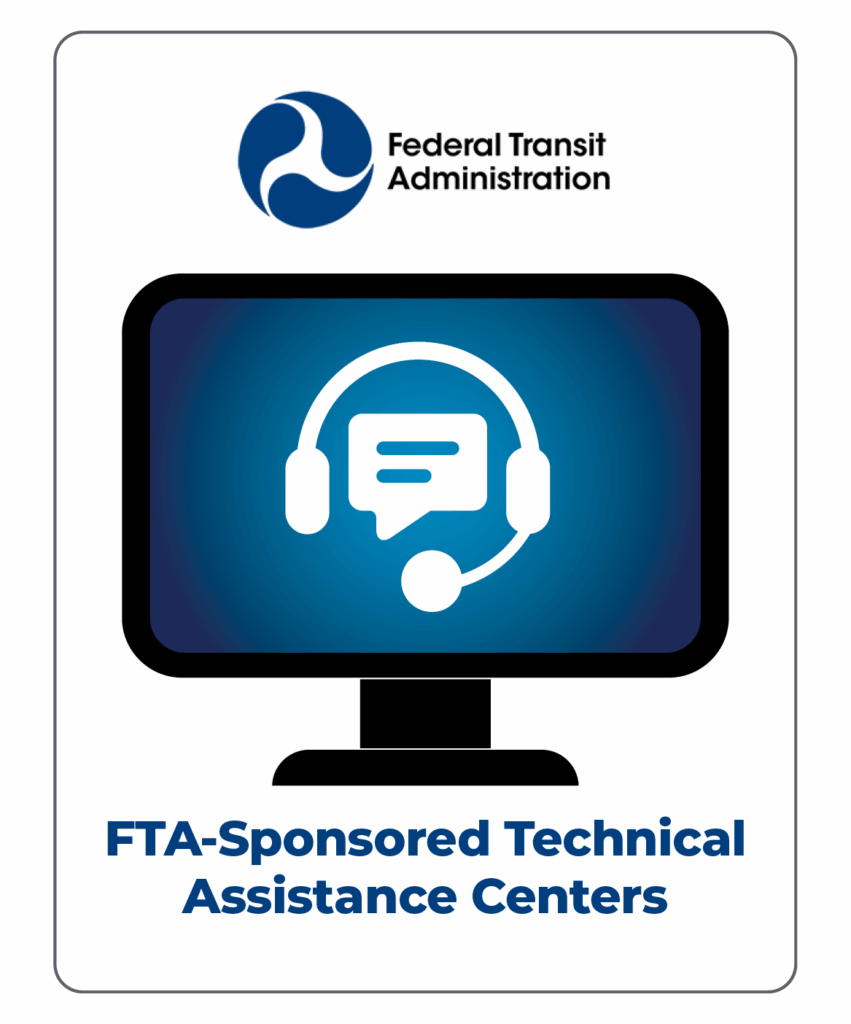
FTA-Sponsored Technical Assistance Centers
Federal Transit Administration
TOPICS: Apprenticeship , Career Pathways , Community Engagement , Hiring and Recruitment , Labor-Management Partnerships , Low-No , Mentorship , Policy and Planning , Procurement , Program Evaluation and ROI , Retention , Safety and Health , Trainer and Mentor Development , Training , Workforce Shortage
FTA’s Technical Assistance and Workforce Development Program (49 U.S.C. § 5314) and the Public Transportation Innovation Program (49 U.S.C. § 5312) fund technical assistance centers through national nonprofit organizations across a number of areas to improve public transportation. These nonprofit partners and the work they do play a critical role in supporting public transit agencies. Their services help to:
- Improve transportation for older adults and people with disabilities
- Drive the adoption of mobility management and related promising practices
- Accelerate innovative mobility practices and strategies
- Support rural communities
- Leverage new transit technologies
- Train the public transit workforce
- Provide workforce development technical assistance
- Support research projects chosen by the transit industry that address day to day issues
- Support the transit industry meet safety regulations
National Center for Applied Transit Technology (N-CATT)
The National Center for Applied Transit Technology (N-CATT) delivers expert, focused technical assistance to transit agencies and organizations in rural areas and small cities to use or develop transit technologies and innovations that make services more cost-effective and efficient. N-CATT’s work supports FTA’s mission and focus on innovation by developing and supporting transit programs and services in rural and small-city America.
National Aging and Disability Transportation Center (NADTC)
The National Aging and Disability Transportation Center (NADTC) is a national technical assistance center funded by FTA with guidance from the U.S. Department of Health and Human Services’ Administration for Community Living to promote the availability of transportation options that serve the needs of people with disabilities, seniors and caregivers with a focus on the Section 5310 program and other transit investments. NADTC supports the delivery of more effective, efficient, high-quality and coordinated specialized transportation services that maximize federal investments. NADTC provides technical assistance, information and referral; develops field training; implements interactive communication and outreach strategies; and supports communities in assessing their needs and developing innovative transportation solutions.
National Rural Transit Assistance Program (National RTAP)
The National Rural Transportation Assistance Program (RTAP) was established by FTA in 1987 to provide a wide range of professional services and products. National RTAP addresses the training and technical assistance needs of rural and tribal transit programs across the nation and supports state RTAP programs. National RTAP provides comprehensive free technical assistance programs and resources including training materials, webinars, newsletters and technical briefs, peer resources, research, and innovative technology initiatives. The National RTAP also manages the Transportation Technical Assistance Coordination Library (TACL), which provides a sustainable methodology and platform to access resources across a diverse range of transportation technical assistance centers and FTA.
Shared-Use Mobility Center (SUMC)
The Shared-Use Mobility Center is a public-interest organization dedicated to achieving equitable, affordable, and environmentally sound mobility across the US through the efficient sharing of transportation assets. By connecting the public and private sectors, piloting programs, conducting new research, and providing policy and technical expertise to cities and regions, SUMC seeks to extend the benefits of shared mobility for all. The Shared Mobility 2030 Action agenda includes improving access to public transit, on-demand shuttles or buses, ride-on-demand services, carpooling and vanpooling, and carsharing, bikesharing and scooter-sharing.
Coordinating Council on Access and Mobility (CCAM)
The strategic goal of CCAM, operated but the Community Transportation Association of America, is to support federal agencies, their grantees, partners, and stakeholders in improving transportation access for people with disabilities, older adults, and individuals of low income. CCAM promotes and facilitates human services transportation, public transit, and non-emergency medical transportation (NEMT) coordination that advances people’s access to everyday destinations.
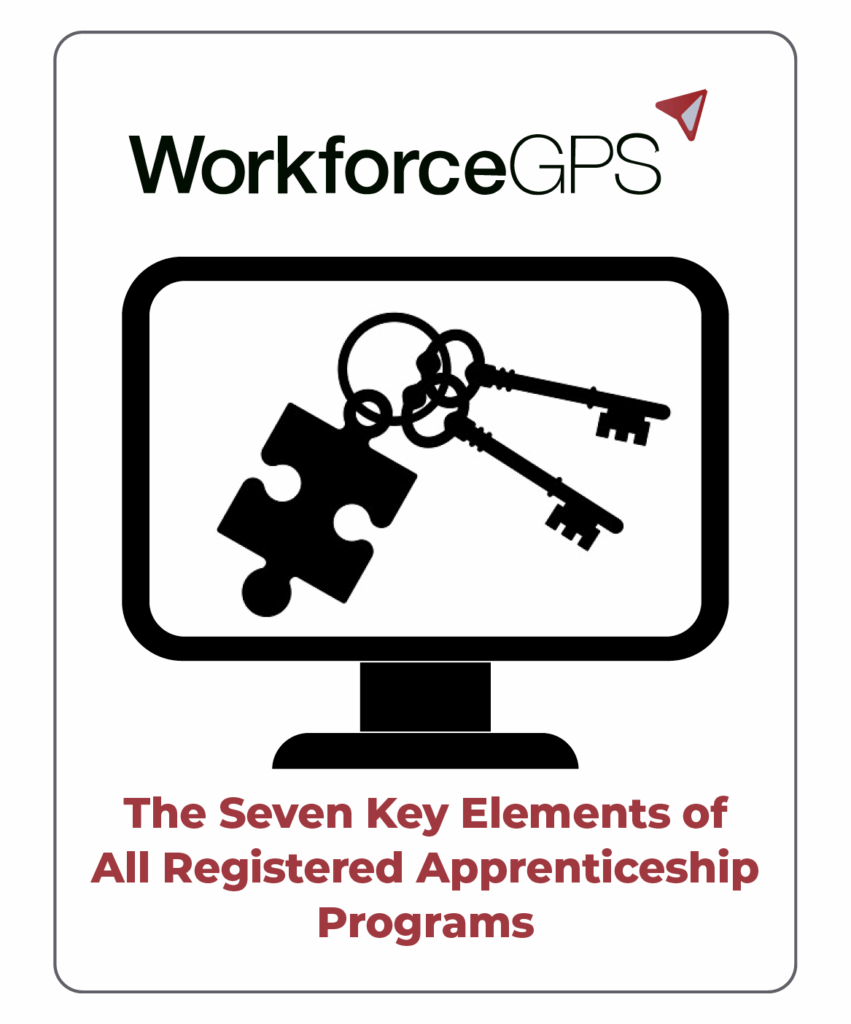
The Seven Key Elements of All Registered Apprenticeship Programs
Workforce GPS
January 2025
TOPICS: Apprenticeship , Career Pathways , Trainer and Mentor Development , Training
Registered Apprenticeship is an industry-driven pathway to high-quality careers where employers can develop and prepare their future workforce, and individuals can obtain paid work experience; progressive wage increases; classroom instruction; and a portable, nationally recognized credential. The U.S. Department of Labor recently updated the way we describe Registered Apprenticeship Programs to reflect the worker safety elements embedded in those programs.
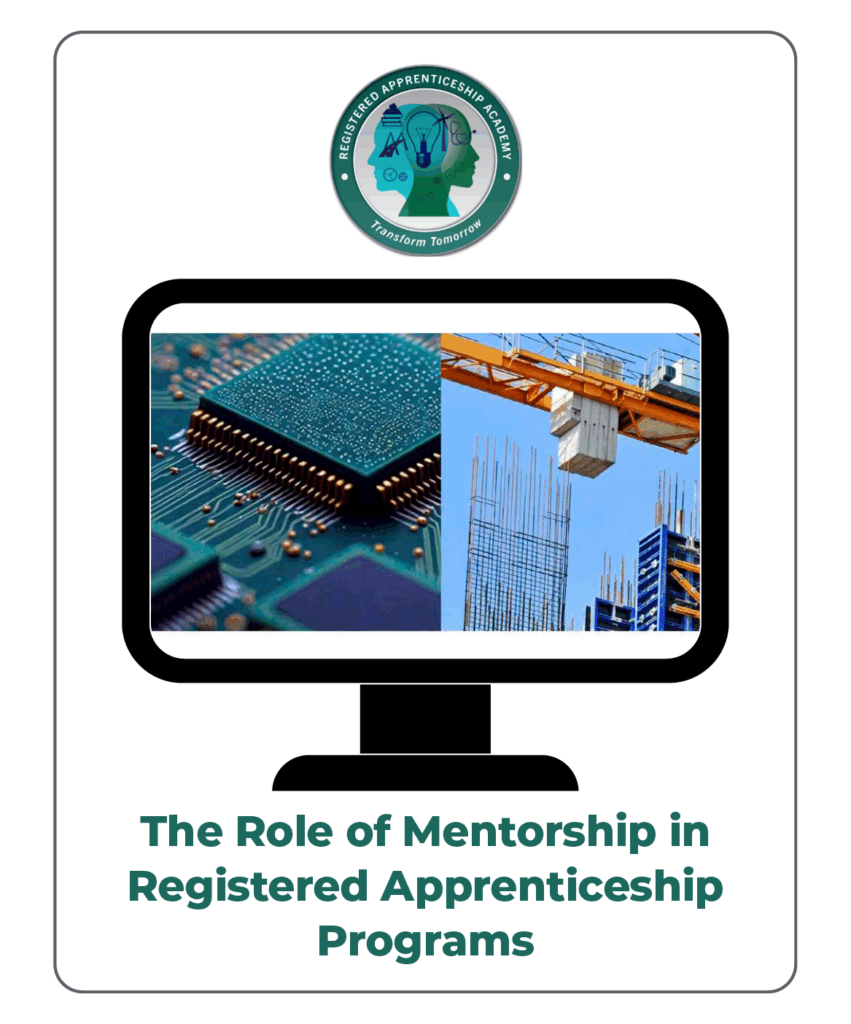
The Role of Mentorship in Registered Apprenticeship Programs
Registered Apprenticeship Academy
January 2025
TOPICS: Apprenticeship , Mentorship , Trainer and Mentor Development , Training
This E-learning module introduces how mentorship is essential to registered apprenticeship programs. Best practices for selecting, training, and supporting mentors are included to support registered apprenticeship program sponsors and participating employers. The objectives for this course are:
- Identify the responsibilities of sponsors to provide mentorship.
- Describe the role of mentors.
- Recognize why mentorship is important to a successful registered apprenticeship program.
- Employ strategies for mentorship to create a culture of support and guidance for workers throughout their registered apprenticeship.
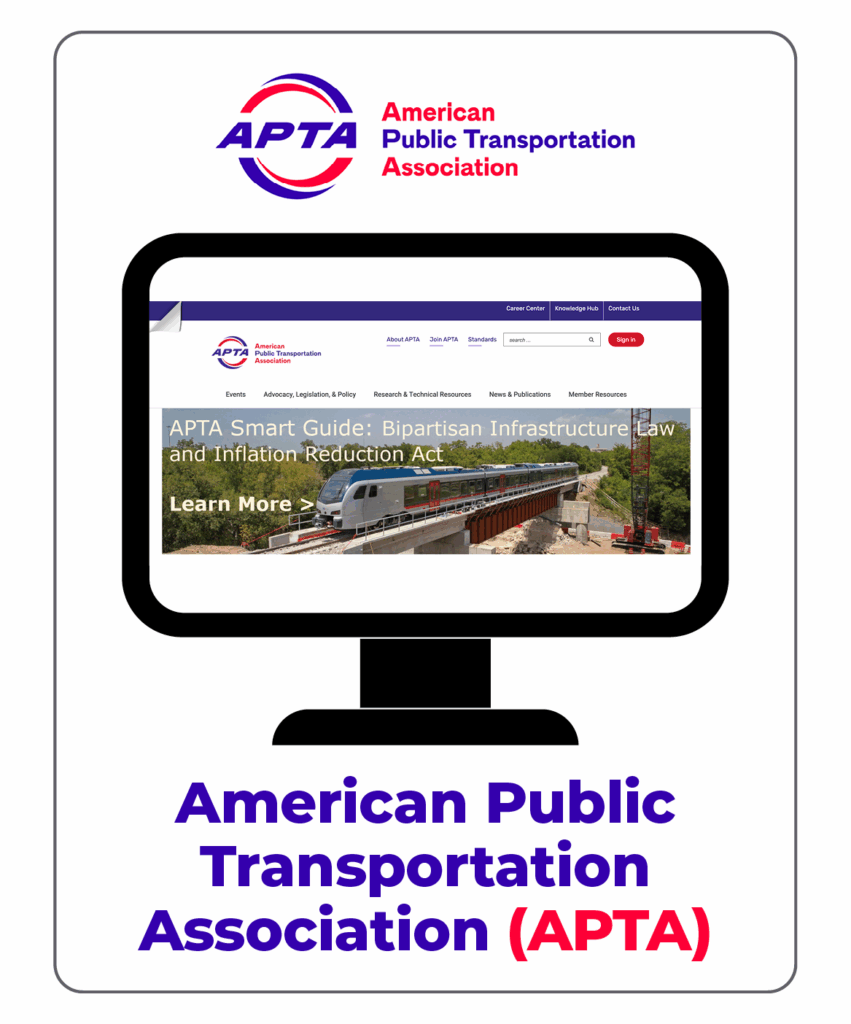
American Public Transportation Association (APTA)
APTA is a nonprofit international association of more than 1,500 public and private sector member organizations. Organizations must pay for membership; benefits include advocacy for federal funding and policies, research, technical expertise and consulting services, workforce development programs, educational conferences and seminars, and 135 subject-matter working committees, including a workforce development committee
American Public Transportation Association
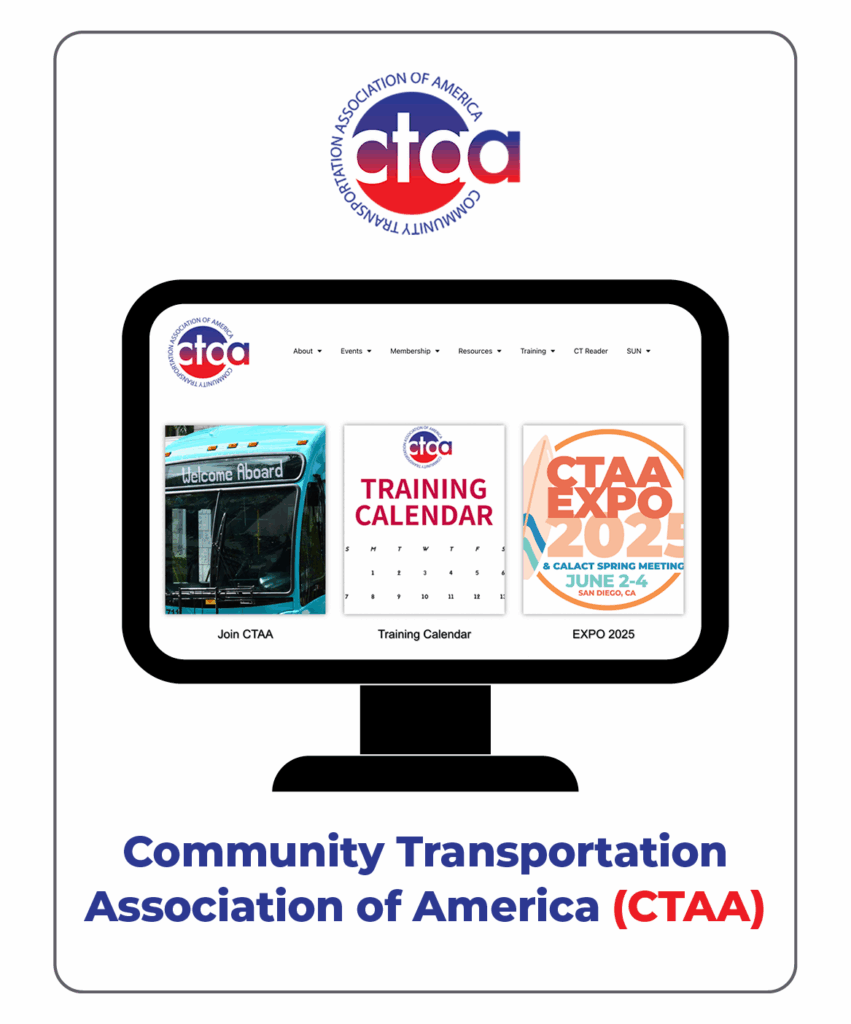
Community Transportation Association of America (CTAA)
CTAA is a nationally recognized expert in rural, small urban, tribal and specialized transportation services. Founded by a small group of community transportation professionals in 1989, organizations and individuals have joined CTAA as members to share strategies, receive training and certification specific to their needs, advance policy and legislative priorities, and improve mobility options in their communities.
Community Transportation Association of America
CTAA members get discounted access to all CTAA training and certification programs – including the annual Community Transportation EXPO and other CTAA Events – and help set the training and certification class agenda with opportunities to suggest and develop new courses and sessions.
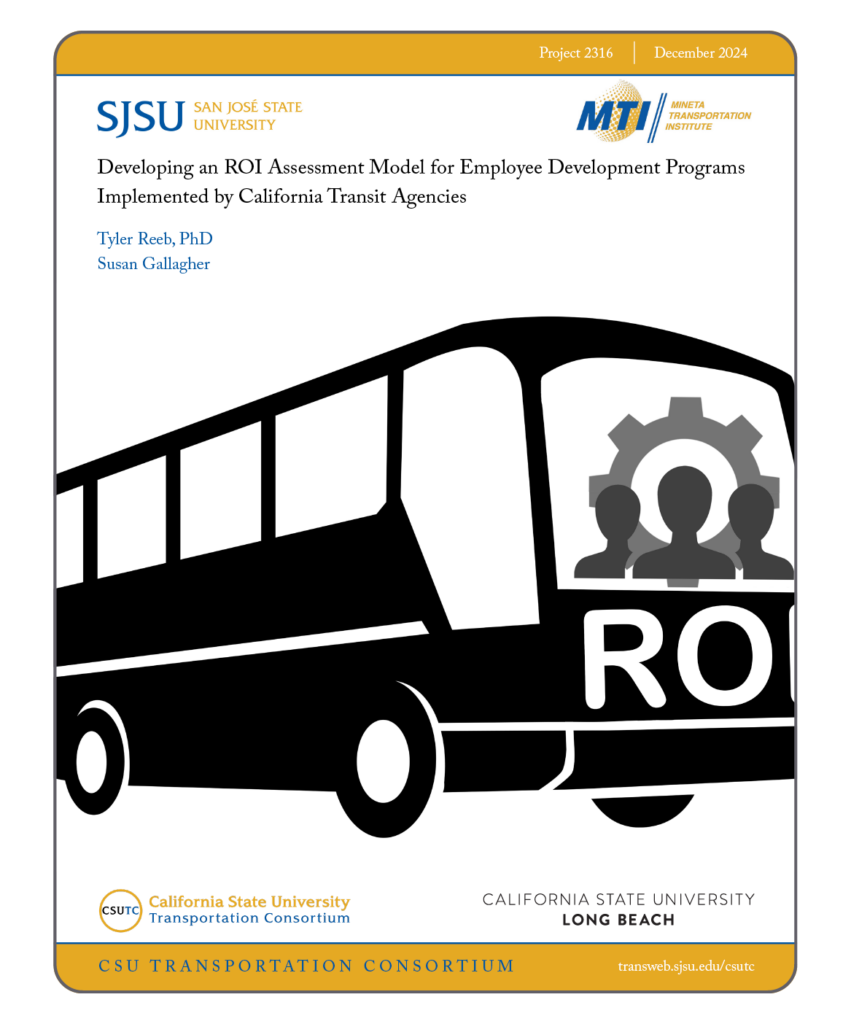
Developing an ROI Assessment Model for Employee Development Programs Implemented by California Transit Agencies
Mineta Transportation Institute (MTI)
December 2024
Transit agencies will necessarily incur expenses in efforts to improve the recruitment, retention, and morale of employees, but will struggle to solicit adequate funding unless they are able to demonstrate the value of such efforts to a broader audience. Thus, developing and implementing ROI assessments is critical. The literature review, survey, and follow-up interviews conducted by the MTI research team found that program outcome measures and programmatic expense data required for ROI is similar across employee development programs but is not currently being uniformly collected across agencies. The research findings demonstrate the need for technical assistance to combat data collection challenges such as staff capacity and know-how.
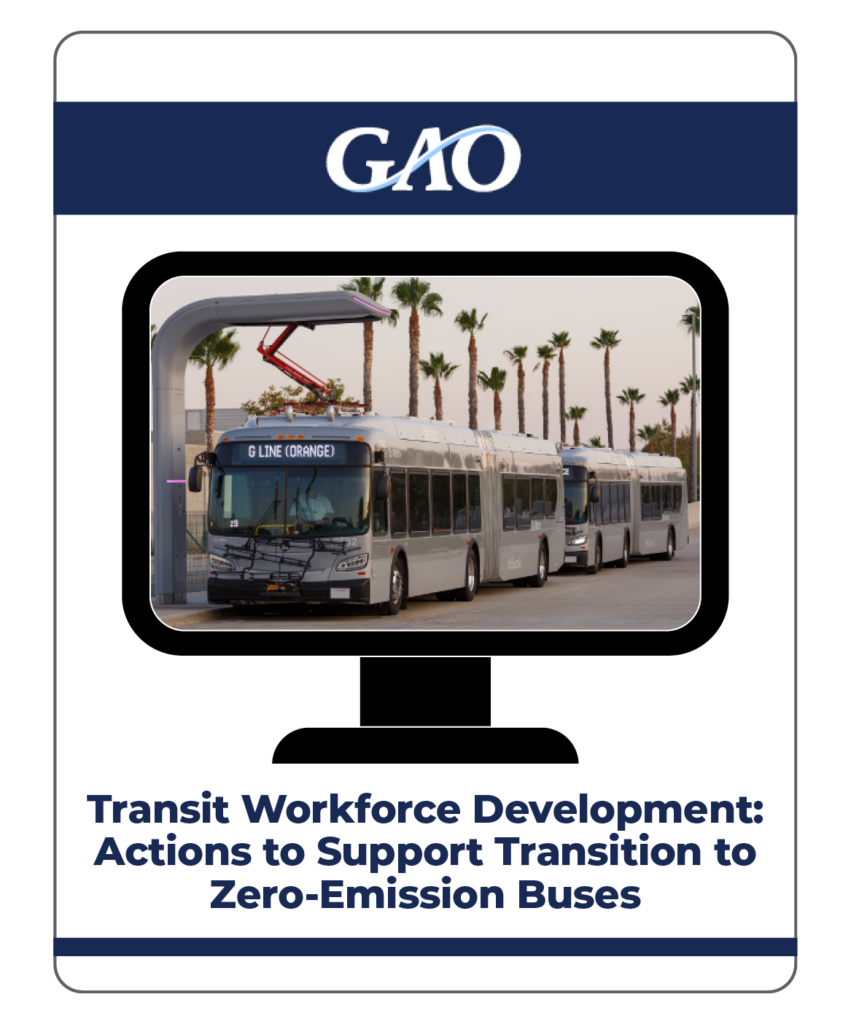
GAO Low-No Transition Report
U.S. Government Accountability Office
December 2024
After data analysis and expert interviews, GAO published this report which describes: (1) the status of transit agencies’ transition to low-no bus fleets and any challenges they may face meeting transition goals; (2) skill- and workforce-development needs of transit agencies and actions selected agencies are taking to address any workforce gaps; and (3) recommended FTA actions to assist transit agencies in preparing their workforces new fuel technologies.
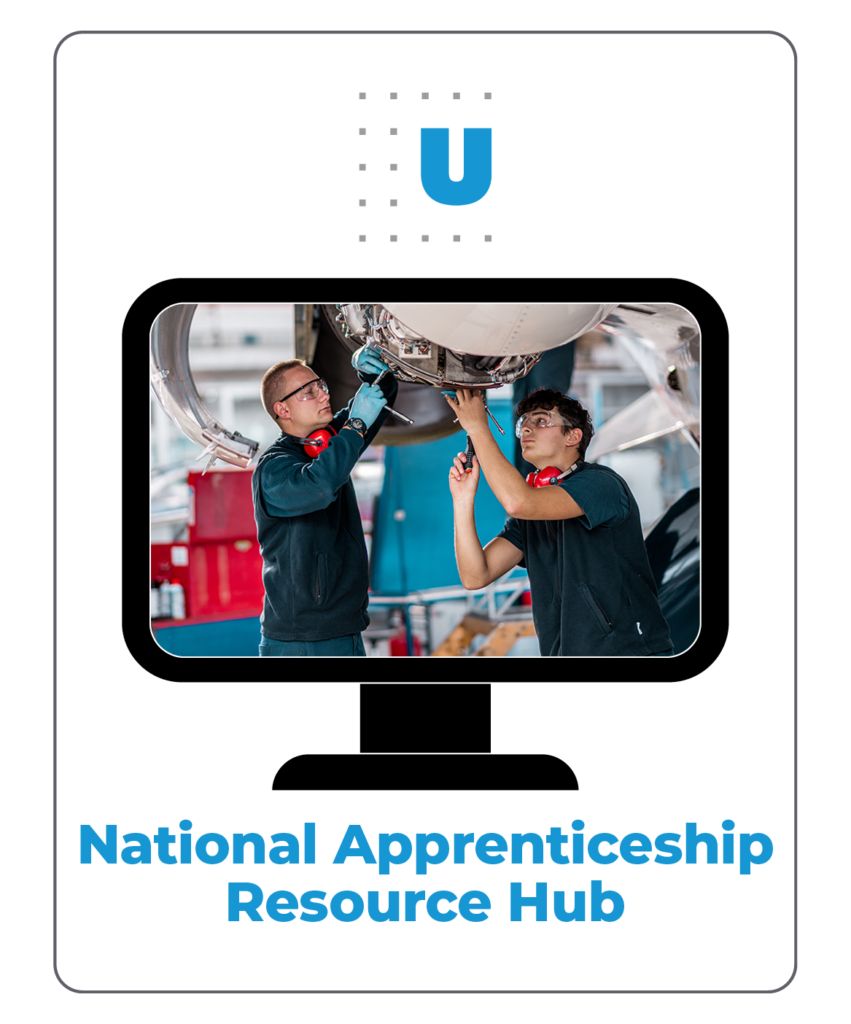
National Apprenticeship Resource Hub
The Urban Institute
December 2024
TOPICS: Apprenticeship , Career Pathways , Trainer and Mentor Development , Training
The National Apprenticeship Resource Hub includes Occupational Frameworks which can help develop a new apprenticeship program or refine an existing program. Each framework outlines the basic information sponsors need to register an apprenticeship program in their occupation including an occupational overview that describes the occupation, alternative job titles, and any prerequisites; a work process schedule that outlines what organizations can expect apprentices to learn on the job and the required hours; and a related technical instruction outline that presents considerations for courses and training apprentices can pursue during the apprenticeship. The National Occupational Frameworks also include detailed instructions on how to use them when creating your registration application.
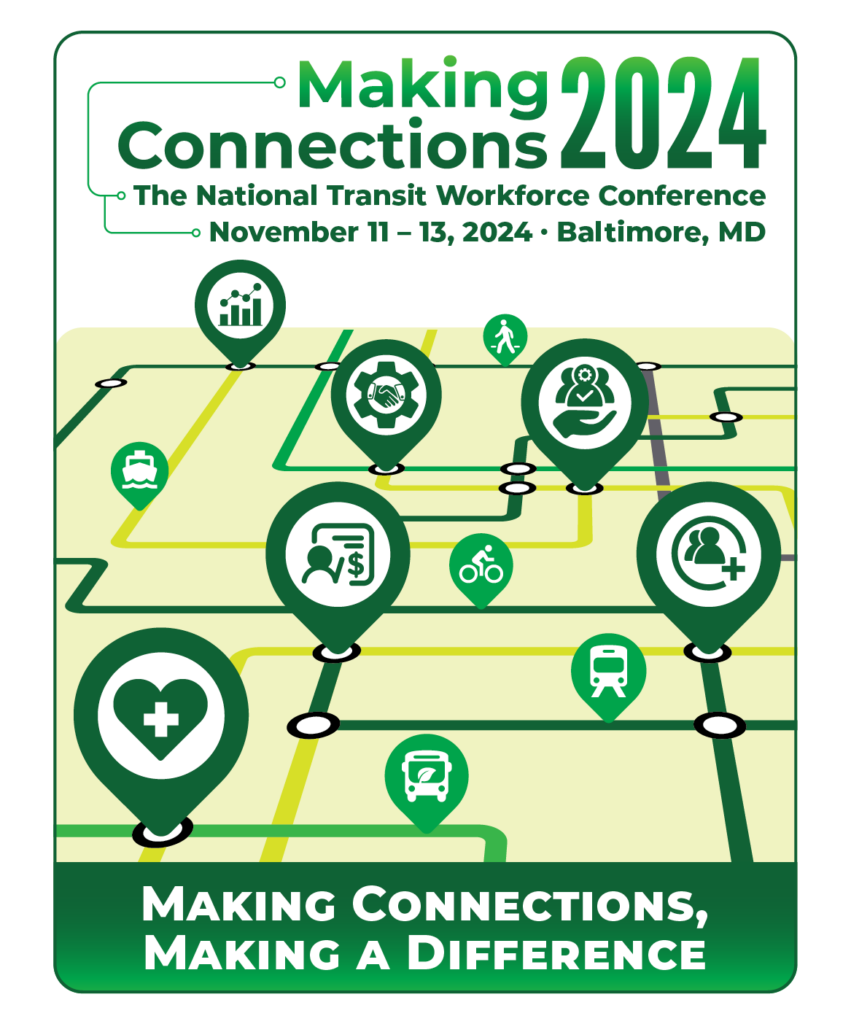
Making Connections 2024 – Engaging and Interactive Training Strategies
This session about innovative and engaging training methods was presented as part of TWC’s Making Connections 2024 transit workforce conference in November, 2024.
Transit Workforce Center
November 2024
Session Description: This session was designed to enhance learner engagement by utilizing interactive learning techniques. Through a discussion led by a panel of seasoned instructional designers from varied backgrounds, the workshop demonstrated how to translate material into engaging activities through the use of storytelling, gamification, and real-world problem-solving exercises. Additionally, the workshop showcased a blend of traditional methods and innovative technology tools to create learner-centered instructional experiences that promote critical thinking, problem-solving, and collaboration through group work and discussions.
Speakers:
- Julie Deibel-Pundt: Program Director, Instructional Design – International Transportation Learning Center / Transit Workforce Center
- Frank Burnett: Training Specialist – International Transportation Learning Center / Transit Workforce Center
- Allie Franklyn: Instructional Designer – International Transportation Learning Center / Transit Workforce Center
- Kristen Ribaudo: Senior Instructional Designer – International Transportation Learning Center / Transit Workforce Center

Making Connections 2024 – Identifying Training Needs, Assessing Workforce Skills Gaps, and Creating Strong Training Programs
This session about assessing training needs and workforce skills gaps was presented as part of TWC’s Making Connections 2024 transit workforce conference in November, 2024.
Transit Workforce Center
November 2024
Session Description: Participants explored effective methods for identifying training needs and assessing workforce skills gaps to develop robust training programs, all in the context of ensuring worker voice and involvement. The session covered tools and techniques for evaluating current training needs for frontline workers, identified areas for improvement, and aligned training strategies with organizational goals. Attendees learned how to use data-driven approaches to map out training priorities that address immediate operational needs and long-term workforce development.
Moderators:
- Kristen Ribaudo: Senior Instructional Designer – International Transportation Learning Center / Transit Workforce Center
- Stu Bass: Principal – Progress Worx; Founding Director – Keystone Development Partnership
Speakers:
- Jeffrey Di Perna: Financial Secretary/Treasurer – Amalgamated Transit Union Local 85 (PA)
- Jason Macumber: Senior Advisor of Workforce Development and Technology – International Transportation Learning Center / Transit Workforce Center

Making Connections 2024 – Making Mentoring Matter: Building and Strengthening Your Frontline Worker Mentorship Program
This full-day intensive session about mentorship was presented as part of TWC’s Making Connections 2024 transit workforce conference in November, 2024.
Transit Workforce Center
November 2024
Session Description: Are you looking to establish a program that increases retention, provides an edge in recruitment, and advances a positive and collaborative organizational culture? Well-organized mentorship programs with carefully-selected and trained mentors provide documented benefits for frontline workers and the organization as a whole. Check out this intensive full-day workshop to explore how to:
- Initiative, develop, manage, and maintain a strong mentorship program
- Establish a collaborative structure and culture that runs and maintains that program
- Select and train effective mentors
- Explore occupation-specific approaches, challenges, and systems
- Track metrics that measure progress and success
Throughout this full-day intensive, attendees engaged with experienced instructors, facilitators, and peers to:
- Review the foundational elements of transit-based mentorship programs
- Experience TWC’s mentor training program, including: a review of mentor roles; an introduction to varied learning styles; and an examination of communications and problem-solving skills
Moderators:
- Maurice Beard: Senior Workforce Development Advisor – International Transportation Learning Center / Transit Workforce Center
- Karitsa Holdzkom: Senior Policy Analyst – International Transportation Learning Center / Transit Workforce Center
Speakers:
- Stu Bass: Principal – Progress Worx; Founding Director – Keystone Development Partnership
- Nick Biggar: District Director – Greater Cleveland RTA
- Valerie Campo: Mentor Program Coordinator – Champaign-Urbana Mass Transit
- Lee Estis: Mentor Program Coordinator – Metropolitan Council-Metro Transit (MN)
- Jamaine “G” Gibson: Director of Apprenticeships and Workforce Development – Amalgamated Transit Union
- Steve Jovel: Operations Manager, Workforce Development – Santa Clara Valley Transportation Authority
- Vanessa L’Esperance: Apprenticeship Program Coordinator – Metro Transit/ATU Local 1005 (MN)
- Dionna McCane: ATU Mentorship and Apprenticeship Coordinator – IndyGo
- Darnell Morris: Vice President – ATU Local 268, Greater Cleveland RTA
- Harpreet Singh: JWI Co-Director – Santa Clara Valley Transportation Authority

Making Connections 2024 – Train-the-Trainer Bootcamp: Strategies for Successful Instruction
This full-day intensive session about tools for new and experienced trainers to increase retention and engagement was presented as part of TWC’s Making Connections 2024 transit workforce conference in November, 2024.
Transit Workforce Center
November 2024
Session Description: This intensive full-day session, an abbreviated version of TWC’s popular 5-day Train-the-Trainer Level 1 course, provided both new and experienced trainers with new tools to increase engagement, application, and retention. Participants added to their knowledge, skills, and confidence to fully engage learners and effectively facilitate a variety of instructor-led training programs. Topics included adult learning theory, teaching techniques, and instructional elements that really work! Participants also had the opportunity to observe and critique a teaching demonstration — learning what does and what does not contribute to impactful learning.
Check out experienced instructors and your trainer-peers from across the industry to explore the following topics:
- How do adults learn, and what does adult learning theory tell us that we can use in our training?
- What are the key instructional elements of successful classroom and hands-on training?
- What are lesson plans, and how are they developed?
- Which teaching techniques help strengthen classes and instructional presentations?
Speakers:
- Frank Burnett: Training Specialist – International Transportation Learning Center / Transit Workforce Center
- Julie Deibel-Pundt: Program Director, Instructional Design – International Transportation Learning Center / Transit Workforce Center
- Marina Budeyeva: Instructional Designer – International Transportation Learning Center / Transit Workforce Center
- Jessica Supervielle: Instructional Designer – International Transportation Learning Center / Transit Workforce Center

2024 Sector Strategies Framework
WorkforceGPS
September 2024
In September 2024, ETA released an updated Sector Strategies Framework to guide national, state, and local practitioners in their efforts to launch and implement effective sector strategies. The Framework is intended to advance knowledge and support the development, scaling, and durability of sector strategies. It provides workforce system practitioners with a clear picture of the concepts and elements essential to the successful implementation of sector partnerships and sector strategies. The Sector Strategies Framework was developed by ETA to harness lessons learned from the field, provide support to overcome common barriers, and help practitioners build knowledge in new areas.
Along with the Framework, the ETA released additional resources including:
- Implementation Guide and Self-Assessment and Action Planning Tool: Resources to help practitioners implement the Framework and assess and strengthen existing sector strategies efforts.
- ETA Blog Post: “Demand-driven training: Reimagining sector partnerships to build career pathways”
- Training and Employment Notice No. 08-24: Release and Availability of Updated 2024 U.S. Department of Labor’s Sector Strategies Framework
- Virtual Training Series: Learn more about the Framework and strategies to implement and scale sector strategies by viewing each session in this three-part series.
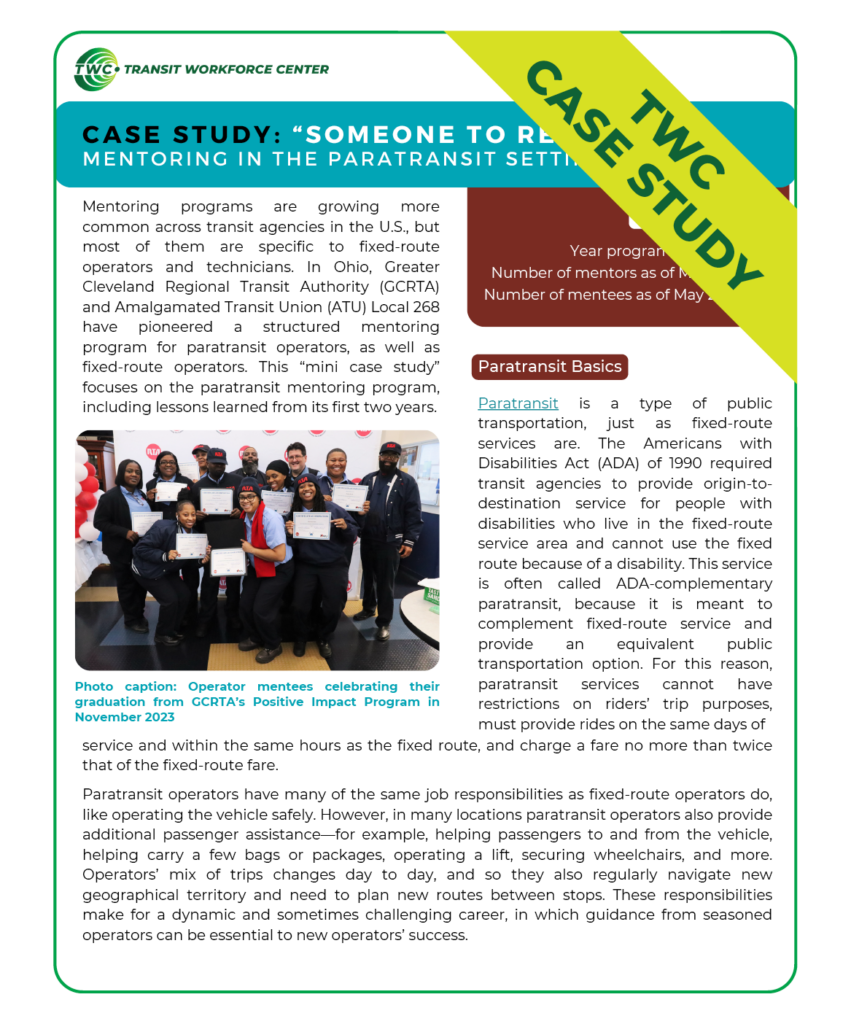
Case Study: Mentoring in the Paratransit Setting
Transit Workforce Center
September 2024
TOPICS: Community Engagement , Mentorship , Trainer and Mentor Development , Training
“Someone to Rely On”
Mentoring programs are growing more common across transit agencies in the U.S., but most of them are specific to fixed-route operators and technicians. In Ohio, Greater Cleveland Regional Transit Authority (GCRTA) and Amalgamated Transit Union (ATU) Local 268 have pioneered a structured mentoring program for paratransit operators, as well as fixed-route operators. This “mini case study” focuses on the paratransit mentoring program, including lessons learned from its first two years.
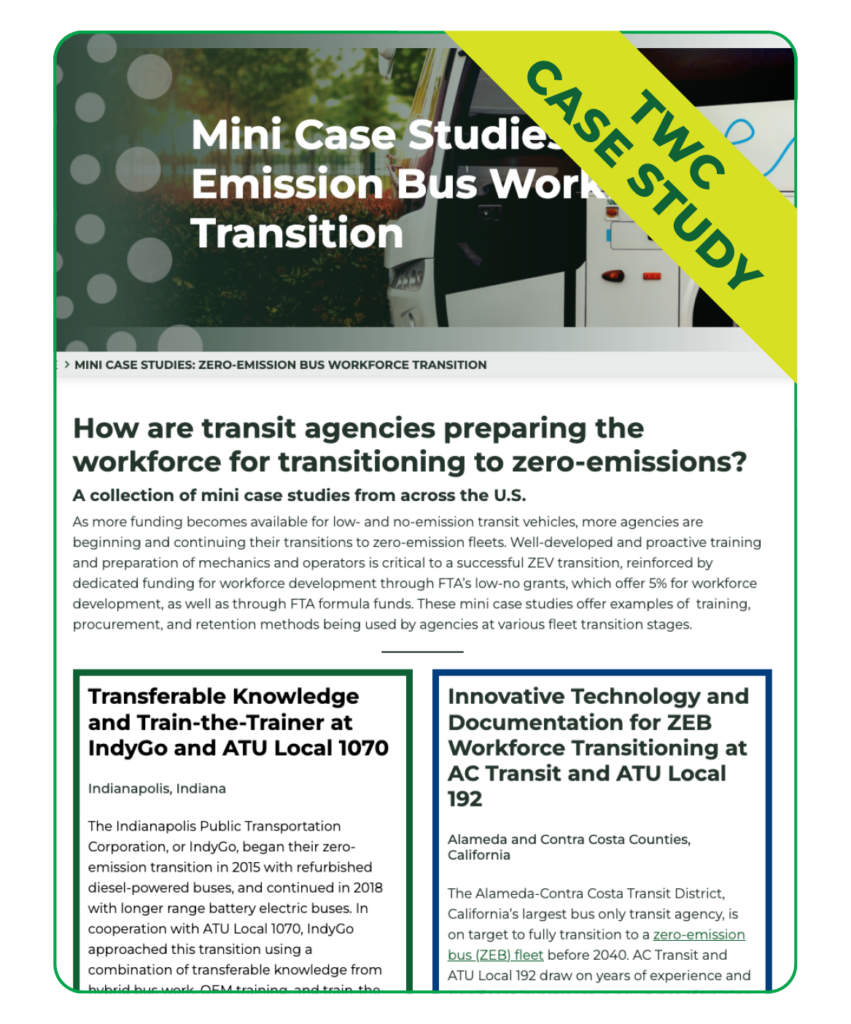
Mini Case Studies: Low-No Workforce Transition
Transit Workforce Center
August 2024
TOPICS: Apprenticeship , Low-No , Trainer and Mentor Development , Training
In the past decade, the number of hybrid, battery-electric, and hydrogen fuel cell buses has increased substantially across the U.S., particularly as transit locations have made use of FTA’s Low-No grant program. Well-developed and proactive training and preparation of technicians and operators is critical for a successful transition to new vehicle technologies; maintaining and operating newly procured vehicles effectively is necessary for fleet reliability and efficiency. Transit locations have supported training and other initiatives through FTA’s Low-No grants, which offer 5% for workforce development, as well as through formula funds. These mini case studies offer examples of training, retention, and procurement methods being used by transit agencies to support new fleet technologies.
- Foundational Skills and Technician Engagement at Champaign-Urbana Mass Transit District
- Bringing Training In-House at Mountain Line and Teamsters Local 2
- Transferable Knowledge and Train-the-Trainer at IndyGo and ATU Local 1070
- Innovative Technology and Documentation for Workforce Transitioning at AC Transit and ATU Local 192
- Training Operators Through Pre-Apprenticeship, Apprenticeship, and Mentorship at Golden Gate Transit and ATU Local 1575
- Frontline Worker Involvement in Vehicle Procurement at SporTran and ATU Local 588
- Midwest Hydrogen Center of Excellence at SARTA and AFSCME Local 1880
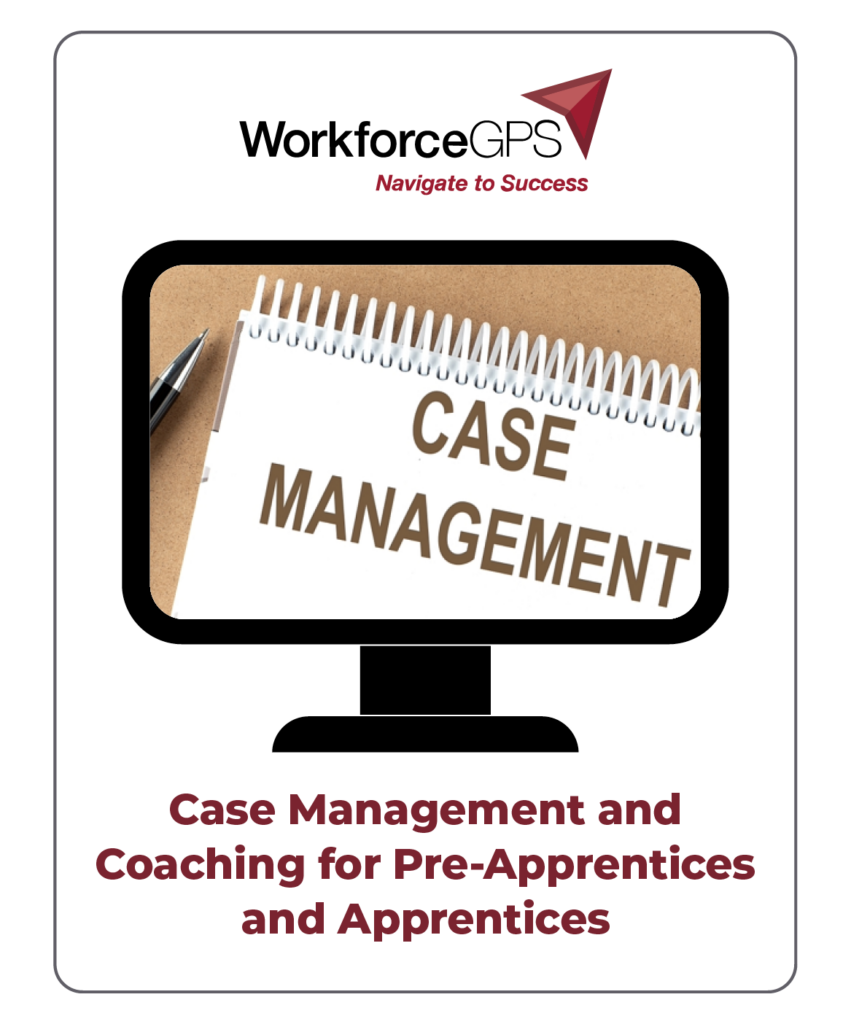
Case Management and Coaching for Pre-Apprentices and Apprentices
Workforce GPS
August 2024
TOPICS: Apprenticeship , Career Pathways , Mentorship , Trainer and Mentor Development , Training
Working with pre-apprentices and apprentices requires a combination of case management and coaching. This webinar provides the fundamentals of case management and coaching and teaches a framework for effective service delivery. This session also focuses on the use of assessments for productive service planning, quality program documentation and team communication for successful handoffs.
MODERATOR(S)
- Luis Roig, Contracting Officer’s Representative, Office of Apprenticeship, U.S. Department of Labor Employment and Training Administration
PRESENTER(S)
- Amy Landesman, Grantee Coach, ICF
- Valerie Taylor, Grantee Coach, ICF
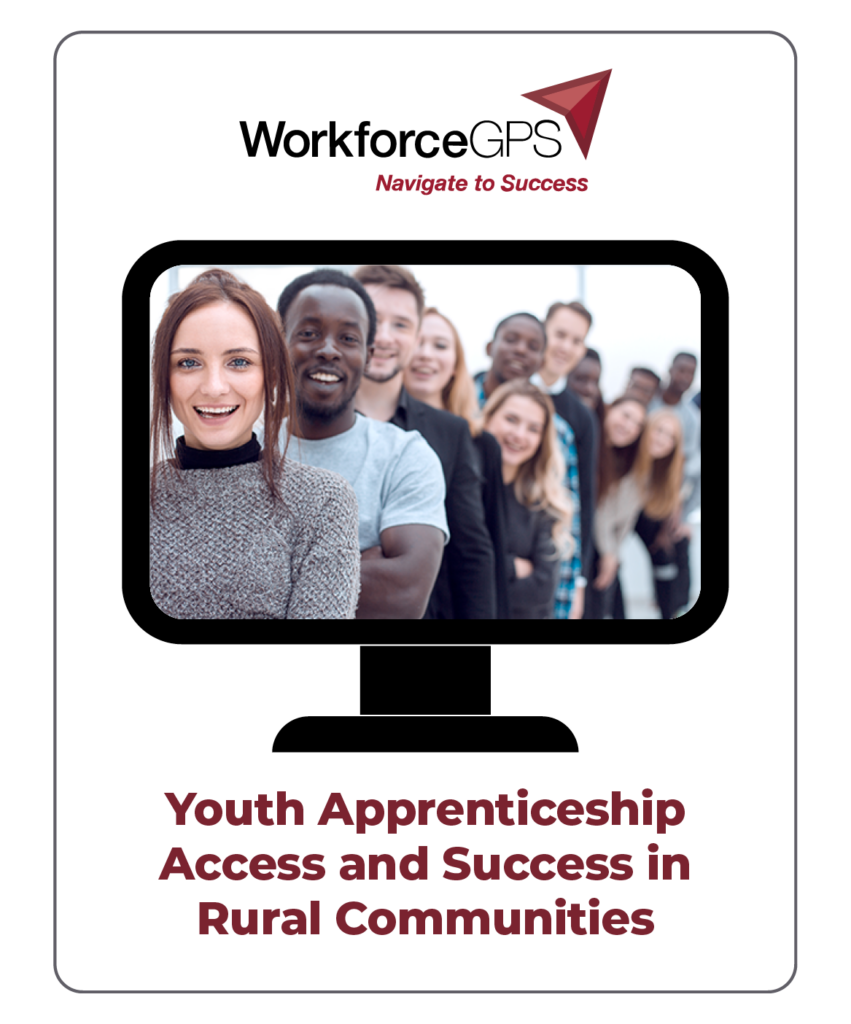
Youth Apprenticeship Access and Success in Rural Communities
WorkforceGPS
August 2024
In rural communities, widely dispersed populations face a multitude of access challenges. Faced with a declining talent pool, lower educational attainment, and rising poverty rates caused by the Covid-19 pandemic, there is an urgent need to prepare young people in rural areas for high-demand careers.
As part of the Implementing Workforce Programs for Rural Youth series, this webinar, hosted by the Office of Apprenticeship, focused on best practices and creative solutions for increasing pre-apprenticeship and youth apprenticeship access, enrollment, retention, and program completion for young people in rural areas. Featured youth apprenticeship intermediaries and partners shared their accomplishments in developing youth apprenticeship opportunities in rural areas, establishing networks of support, and best utilizing available resources to ensure pre-and youth apprenticeship success.
MODERATOR(S)
- Maisha Meminger, Manpower Analyst , Division of Youth Services, U.S. Department of Labor, Employment and Training Administration
PRESENTER(S)
- Vanessa Bennett, Associate Director, Center for Apprenticeship & Work-Based Learning, Jobs for the Future
- Zach Boren Senior Policy Program Manager, Urban Institute
- Bhavani Arabandi, Senior Research Associate, Urban Institute
- Jacqueline Rayfield, Policy Analyst, Urban Institute
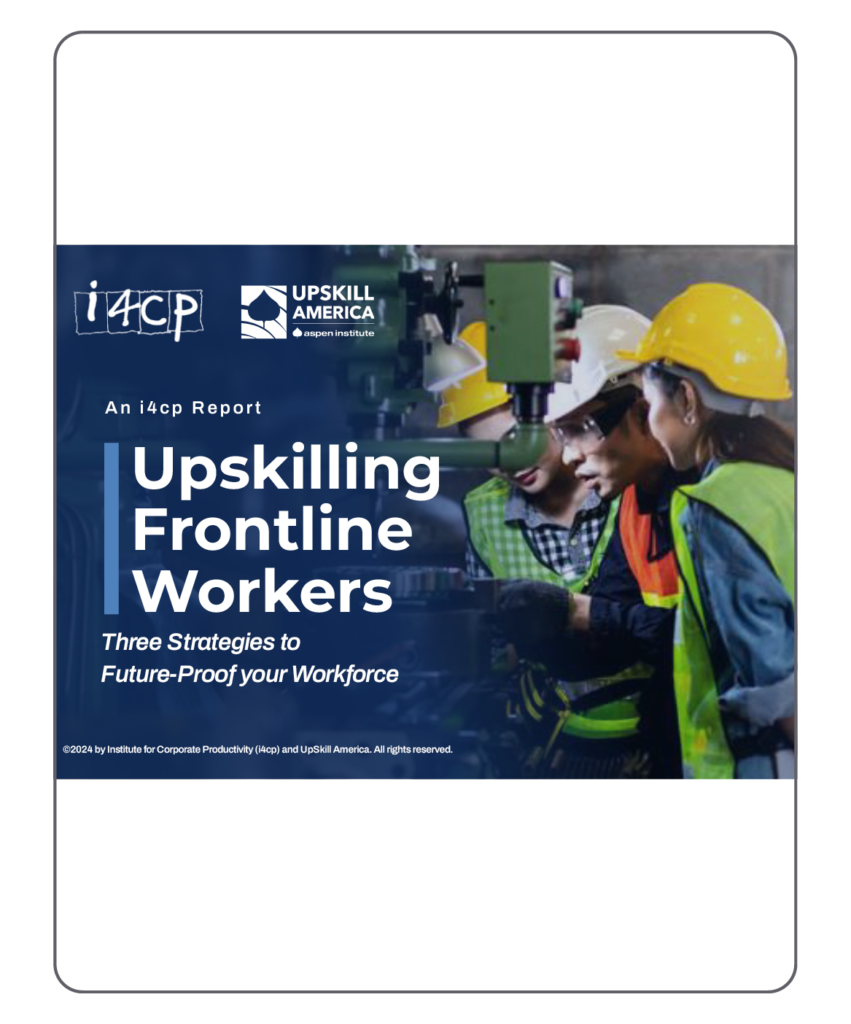
Upskilling Frontline Workers: Three Strategies to Future-Proof your Workforce
UpSkill America & Institute for Corporate Productivity (i4cp)
TOPICS: Apprenticeship , Career Pathways , Trainer and Mentor Development , Training
The rapid advancement and proliferation of technology increases the need for accelerated and continuous workforce development. Prioritizing the upskilling of frontline workers requires a variety of educational programs, and there is no single answer to the upskilling challenge. Still, UpSkill America and the Institute for Corporate Productivity (i4cp) created this report of best practices that can help any organization become more productive and resilient via a skilled workforce.
Read the brief to learn more about next practices in upskilling, including internal training, apprenticeship, and tuition assistance that will help any organization to be more productive and resilient for the future.
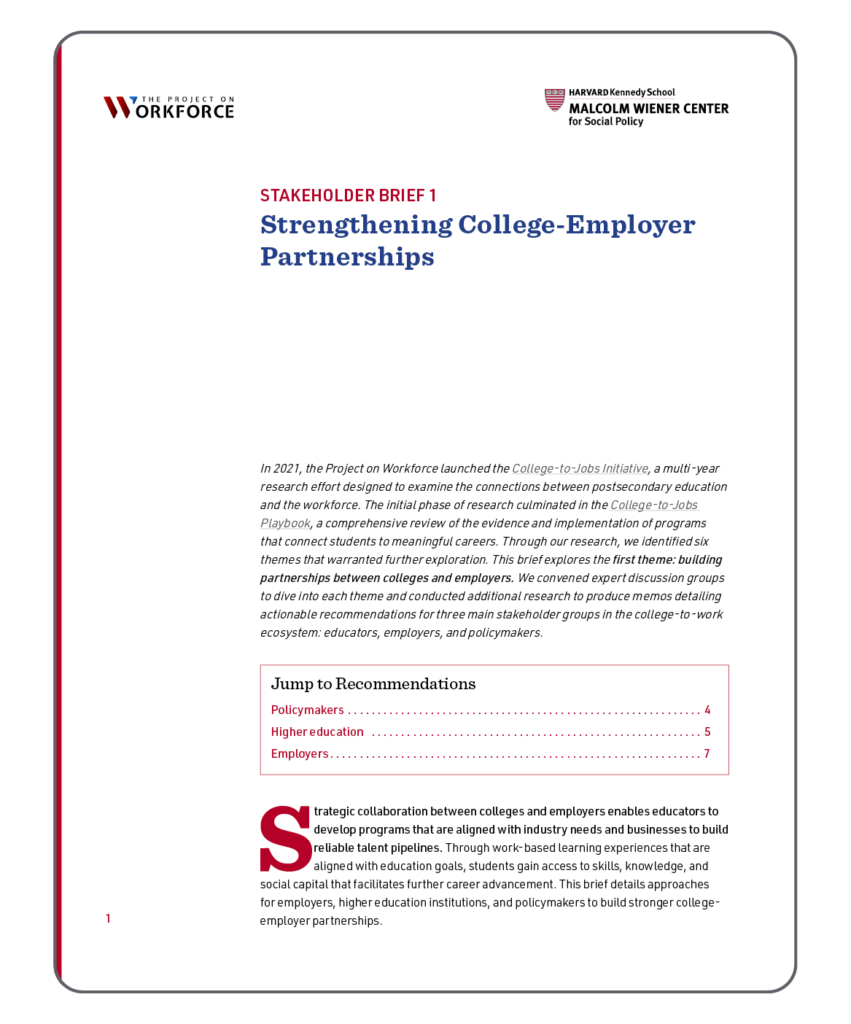
College-to-Jobs Initiative: Policy and Practice Series
The Project on Workforce
The Project on Workforce released new recommendations for educators, employers, and policymakers on how to improve college-to-jobs connections. With these webinars and stakeholder briefs, they aim to increase attention and investment in college-to-career transitions and show how colleges can better deliver on economic prosperity.
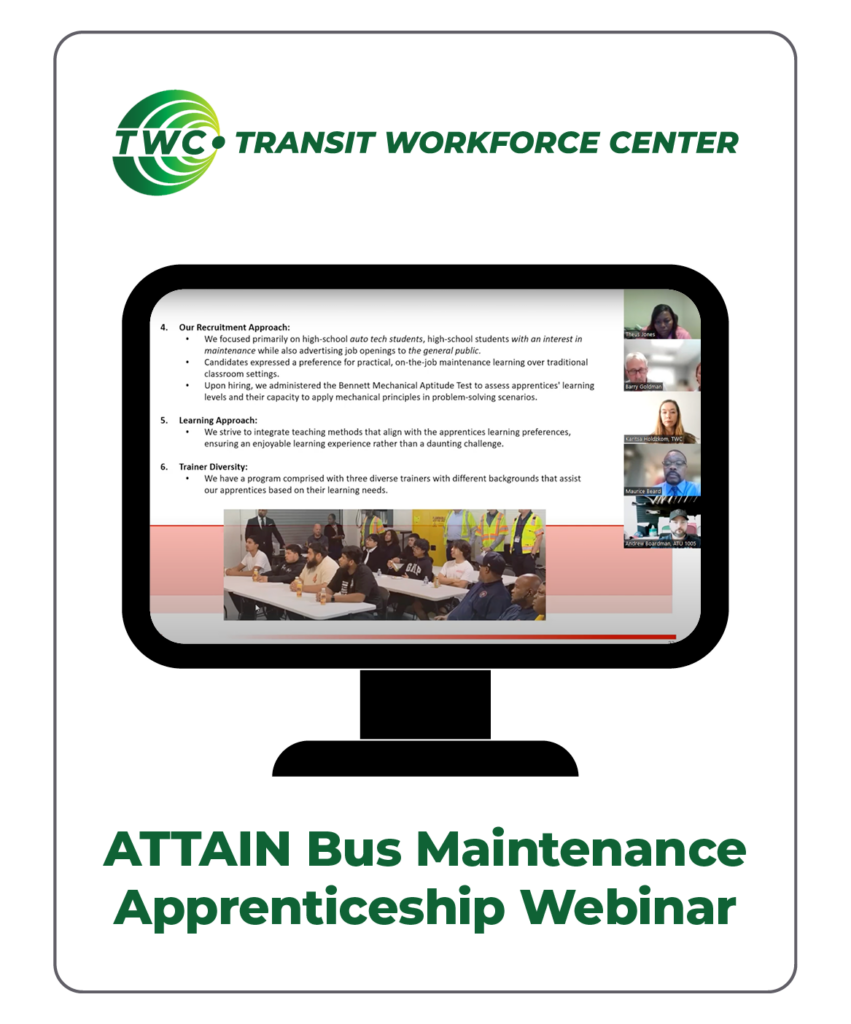
ATTAIN Bus Maintenance Apprenticeship Webinar
Transit Workforce Center
June 2024
TOPICS: Apprenticeship , Mentorship , Trainer and Mentor Development , Training
Enjoy this recorded convening of TWC’s American Transit Training and Apprenticeship Innovators Network (ATTAIN) comprised of several engaging presentations that highlight apprenticeship programs across the nation, followed by interactive discussions with Fairfax County Connector/Amalgamated Transit Union (ATU) Local 689 and Metro Transit/ATU Local 1005 on the development of mentorship and apprenticeship programs, how they work, and the benefits they can offer agencies and their workforce.
Below, you can find the link to the full slideshow used in the meeting.
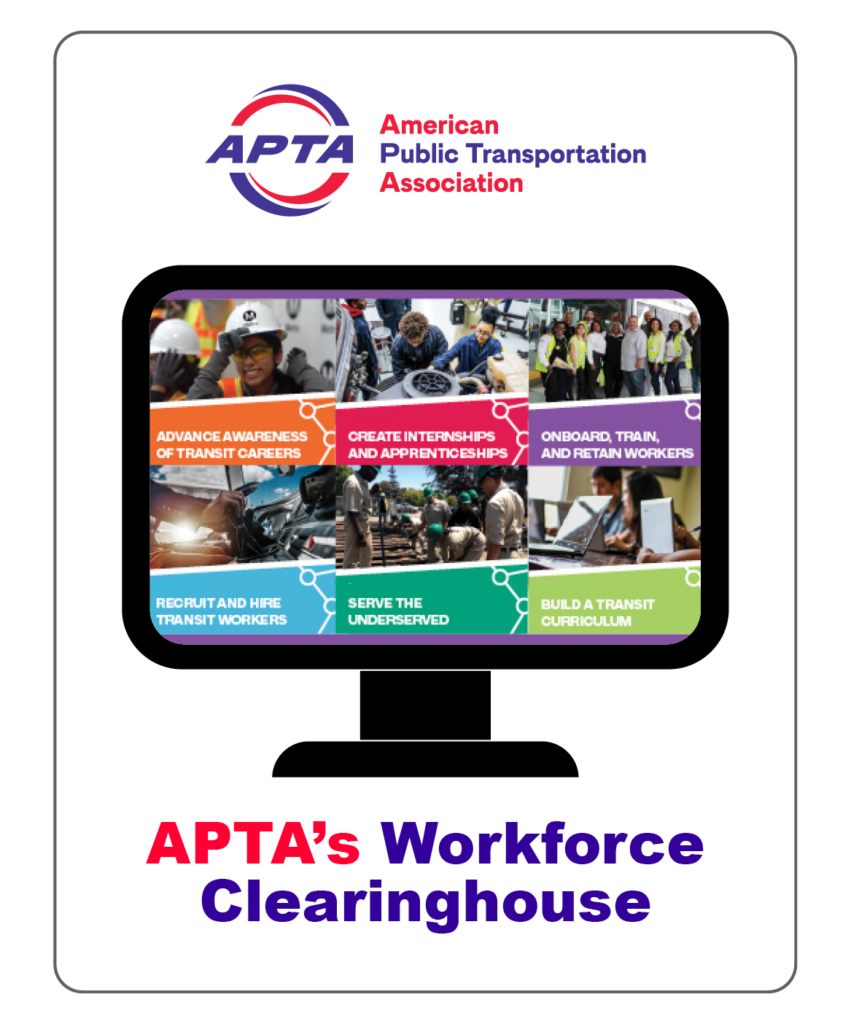
APTA’s Workforce Clearinghouse
APTA’s Workforce Clearinghouse connects users with convenient access to industry materials, stories, and recommended practices. Use the search bar or choose a categorical grouping to find resources from APTA’s six ‘Workforce Mini Guides’ as well as selected examples from the initial workforce volume – APTA’s Transit Workforce Readiness Guide.
American Public Transportation Association (APTA)
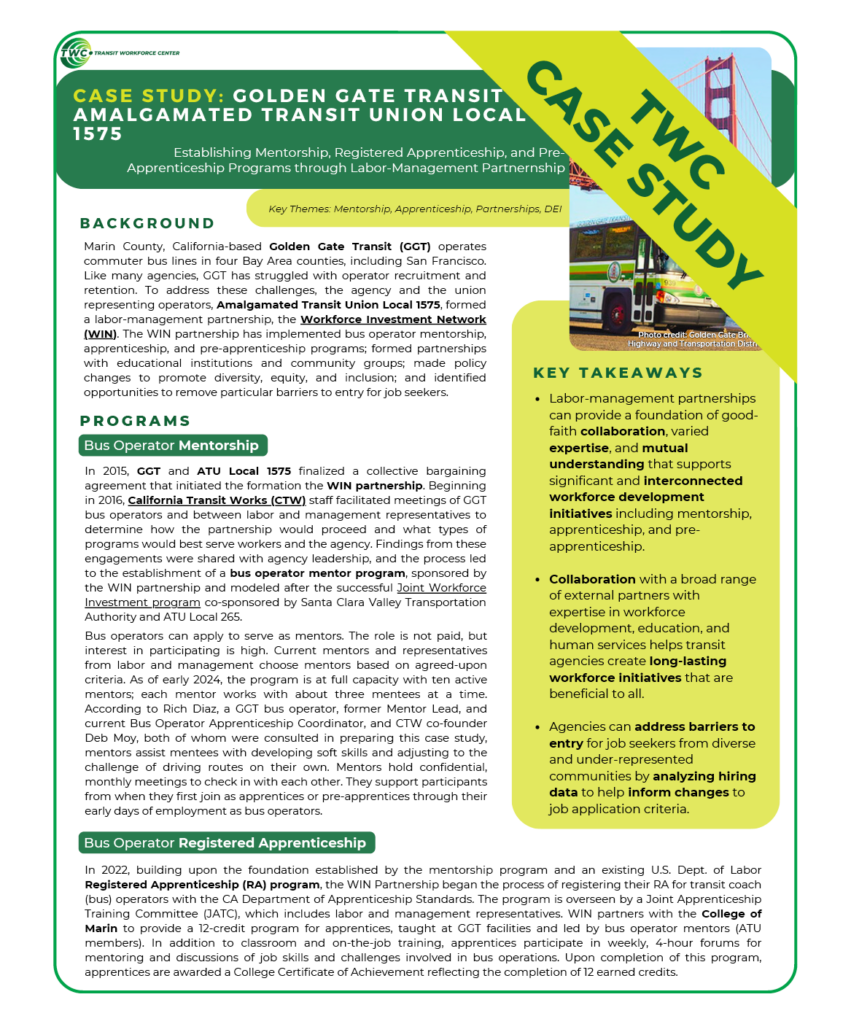
Case Study: Golden Gate Transit & Amalgamated Transit Union Local 1575
Marin County, California-based Golden Gate Transit (GGT) operates commuter bus lines in four Bay Area counties, including San Francisco. Like many agencies, GGT has struggled with operator recruitment and retention. To address these challenges, the agency and the union representing operators, Amalgamated Transit Union Local 1575, formed a labor-management partnership, the Workforce Investment Network (WIN). The WIN partnership has implemented bus operator mentorship, apprenticeship, and pre-apprenticeship programs; formed partnerships with educational institutions and community groups; and identified opportunities to remove particular barriers to entry for job seekers.
Transit Workforce Center
February 2024
Read Rich Diaz’s Transit Career Story on the TWC Blog to learn more.
View the full case study below:
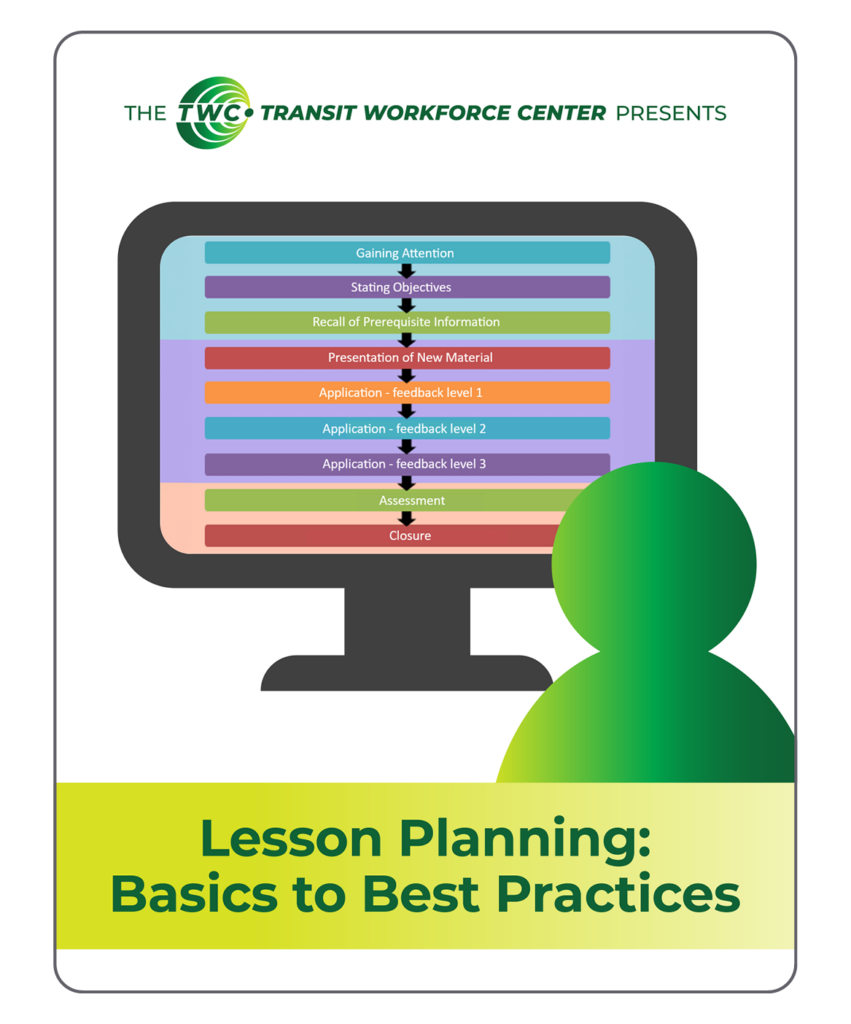
Lesson Planning Webinar: Basics to Best Practices
Have you ever been tasked with developing or delivering a class and didn’t know where to start? Do you have a class that isn’t engaging learners and you don’t know why? On September 26, 2023, TWC hosted an informative webinar on Lesson Planning basics and best practices with award winning author and advisor on all things training, Dr. Chuck Hodell. We took a high-level look at Lesson Planning for those new to training, as well as discussed how to overcome inherent challenges and best practices for transit trainers.
Transit Workforce Center
September 2023
TOPICS: Trainer and Mentor Development , Training
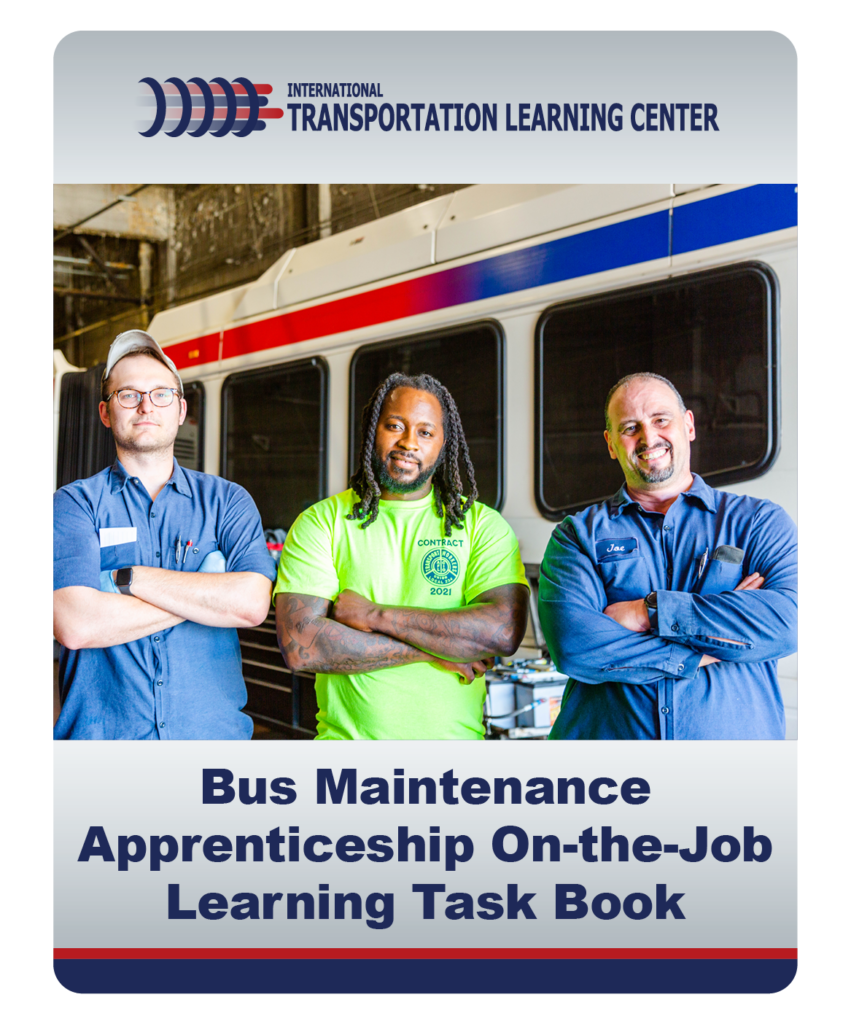
Bus Maintenance Apprenticeship On-the-Job Learning Task Book
International Transportation Learning Center
July 2023
TOPICS: Apprenticeship , Mentorship , Trainer and Mentor Development , Training
The Bus Maintenance Apprenticeship On-the-Job Learning (OJL) Task Book allows mentors and apprentices to track competency. The Task Book contains individual job tasks in 10 job functions (e.g., Electrical & Electronic, Steering & Suspension, etc.). Once the mentor and apprentice both agree that the apprentice is competent in a specific task (e.g., can test, adjust or replace a voltage regulator), each signs-off on that task.
Like the Apprenticeship Framework, the Task Book is aligned with the Automotive Service Excellence (ASE) task list and APTA training standards. Under the Contract/Agreement established by each agency’s Joint Apprenticeship Committee (JAC), however, each agency is free to add, delete or modify tasks to suit their unique operating conditions and bus equipment. The Task Book serves as a useful checklist to make certain that mentors have provided adequate OJL for each job task, and apprentices can demonstrate they are capable of performing those tasks safely and effectively on their own. The use and preservation of the Job Book are the responsibility of both parties.
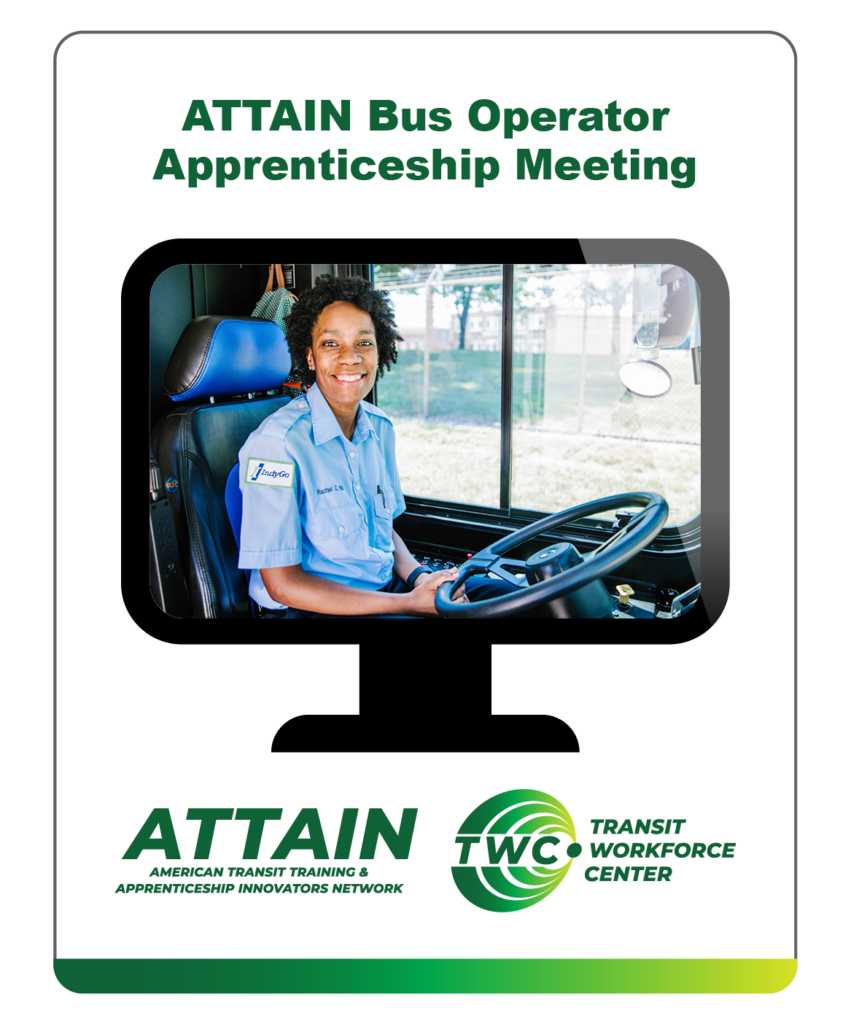
ATTAIN Bus Operator Apprenticeship Meeting
This recorded meeting of the ATTAIN Bus Operator Committee serves as a resource for transit industry stakeholders and includes presentations on apprenticeship and case studies of successful programs across the country.
Transit Workforce Center
May 2023
TOPICS: Apprenticeship , Career Pathways , Mentorship , Trainer and Mentor Development , Training
The American Transit Training and Apprenticeship Innovators Network (ATTAIN), run by the Transit Workforce Center (TWC), is a peer network created for transit agencies and labor unions to explore new apprenticeship programs or enhance existing programs for their frontline workforce.
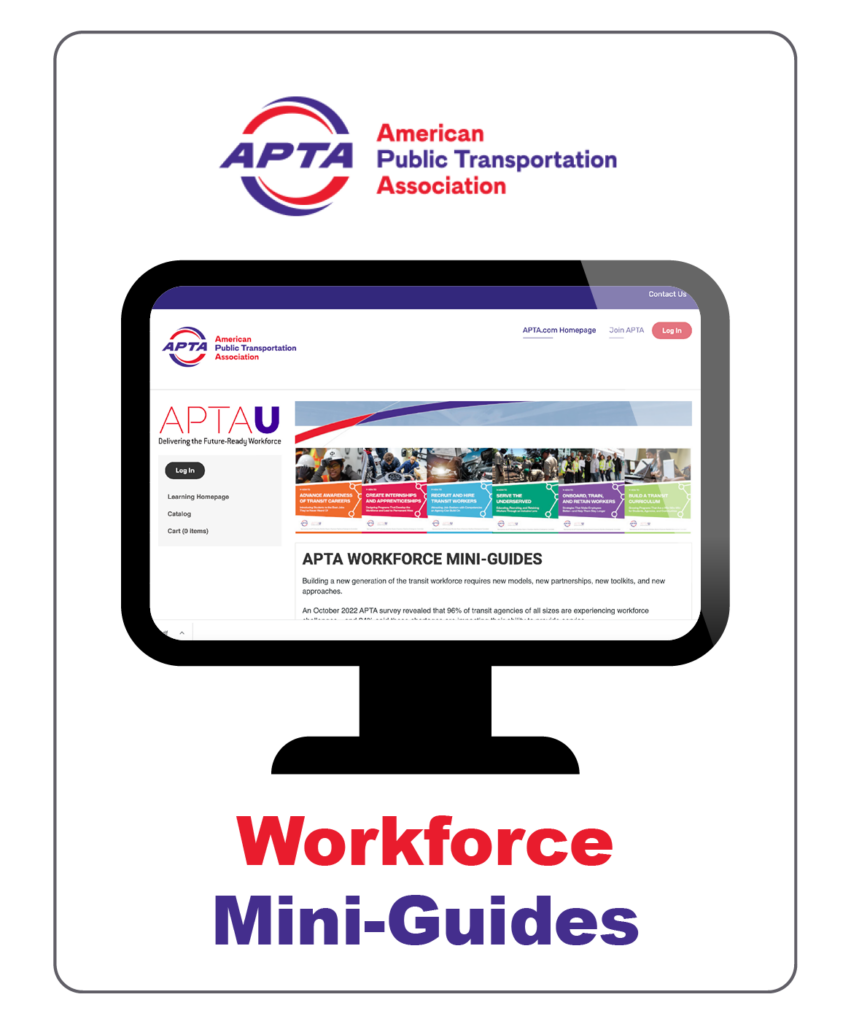
Workforce Mini-Guides
These six workforce development mini-guides are designed to help develop and implement successful strategies to address the critical workforce shortages seen across the public transportation industry. They cover these topics: advancing awareness of transit careers; creating internships and apprenticeships; recruiting and hiring transit workers; serving the underserved in the workforce; onboarding, training, and retaining workers; and building a transit curriculum.
American Public Transportation Association
April 2023
An October 2022 survey conducted by APTA revealed that 96 percent of transit agencies of all sizes are experiencing workforce challenges, and 84 percent said these shortages are impacting their ability to provide service. APTA developed these mini-guides building on their 2021 Transit Workforce Readiness Guide and combining industry insights and stories, case studies, lessons learned, and best practices.
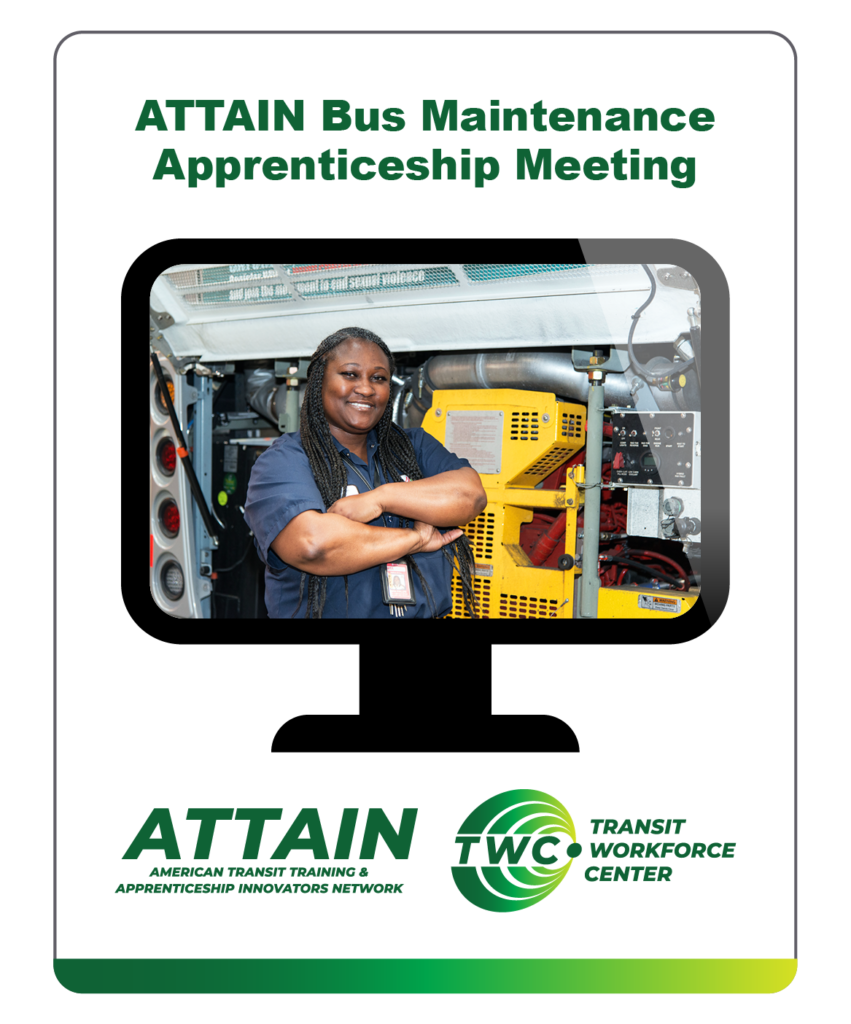
ATTAIN Bus Maintenance Apprenticeship Meeting
The American Transit Training and Apprenticeship Innovators Network (ATTAIN), run by the Transit Workforce Center (TWC), is a peer network created for transit agencies and labor unions to explore new apprenticeship programs or enhance existing programs for their frontline workforce. This recorded meeting of the ATTAIN Bus Maintenance Committee serves as a resource for transit industry stakeholders and includes presentations on apprenticeship and case studies of successful programs across the country.
Transit Workforce Center
March 2023
TOPICS: Apprenticeship , Career Pathways , Trainer and Mentor Development , Training
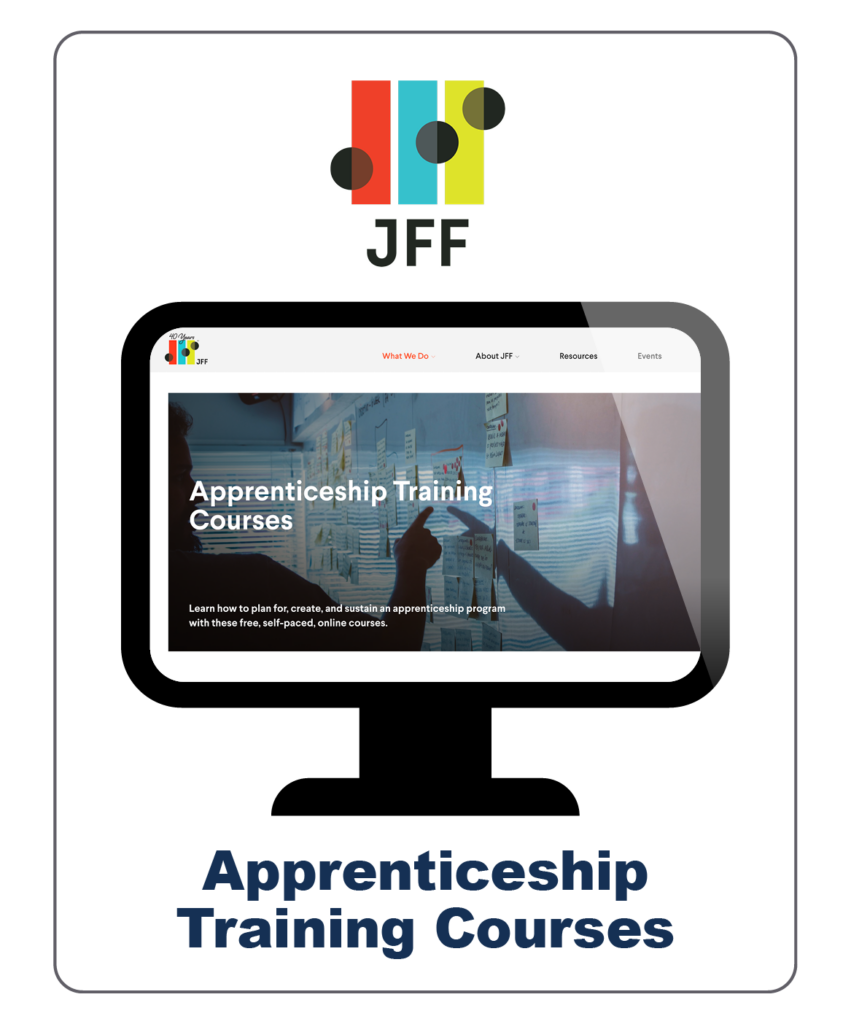
Apprenticeship Training Courses
This series of free online training courses will help transit providers and others plan for, create, and sustain registered apprenticeship programs. Several courses have already been released and others are forthcoming.
Jobs for the Future
March 2023
TOPICS: Apprenticeship , Career Pathways , Mentorship , Trainer and Mentor Development , Training
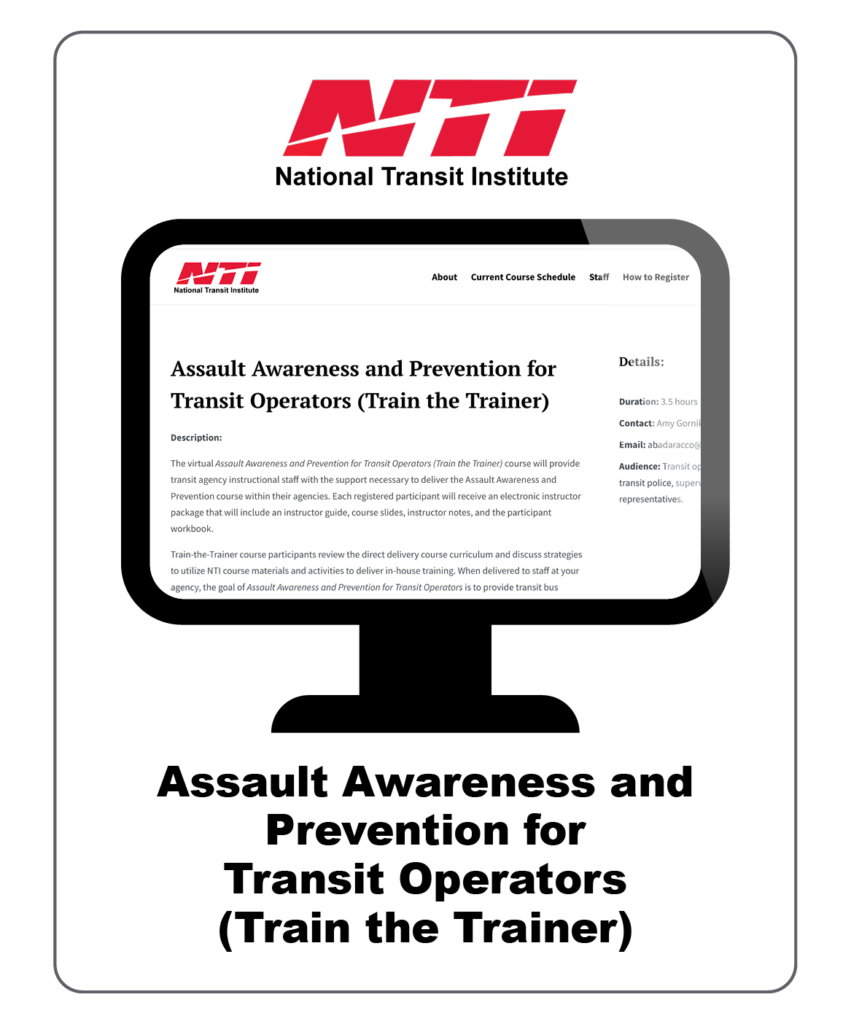
Assault Awareness and Prevention for Transit Operators (Train the Trainer)
This virtual course will provide transit agency instructional staff with the support necessary to deliver the Assault Awareness and Prevention course within their agencies. Each registered participant will receive an electronic instructor package that will include an instructor guide, course slides, instructor notes, and the participant workbook. Participants will be able to deliver the training to provide transit bus operators with knowledge and skills to reduce the likelihood of assault incidents.
National Transit Institute
January 2023
You can register for the course with the Rutgers University Noncredit Course Catalog & Registration System. The direct delivery course for operators can be found here.
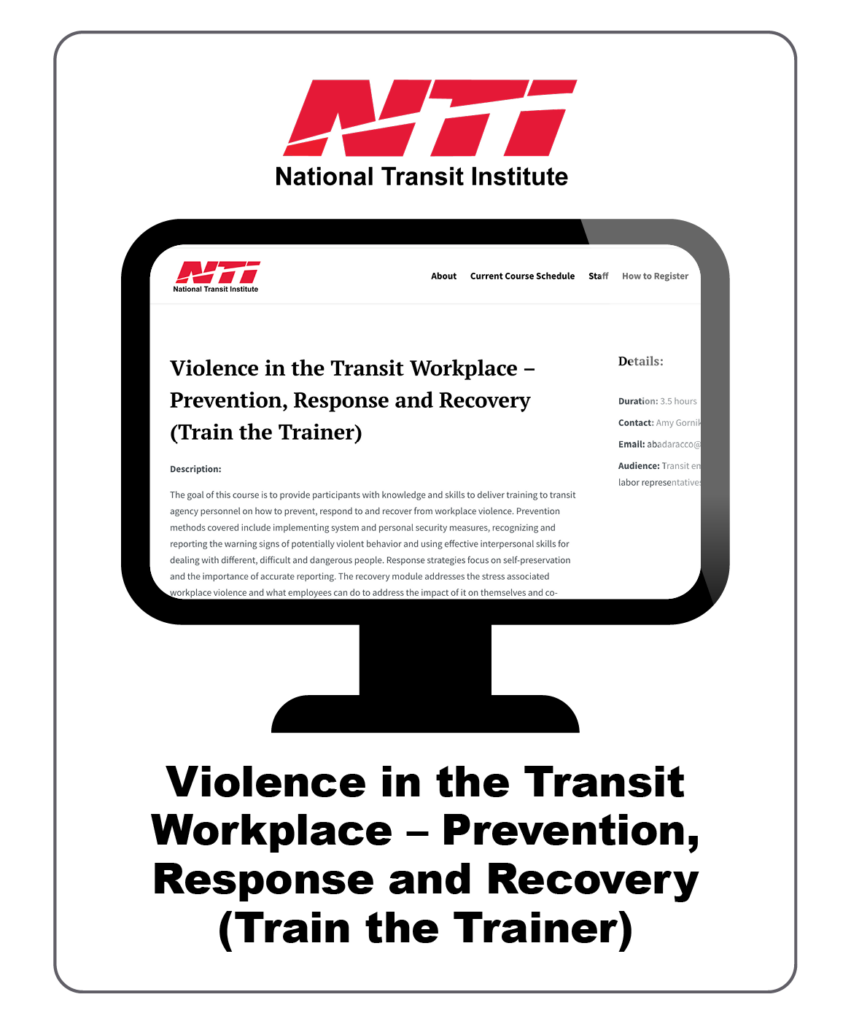
Violence in the Transit Workplace – Prevention, Response and Recovery (Train the Trainer)
The goal of this course is to provide participants with knowledge and skills to deliver training to transit agency personnel on how to prevent, respond to, and recover from workplace violence. Prevention methods covered include implementing system and personal security measures, recognizing and reporting the warning signs of potentially violent behavior and using effective interpersonal skills for dealing with different, difficult and dangerous people.
National Transit Institute
You can register for the course with the Rutgers University Noncredit Course Catalog & Registration System.
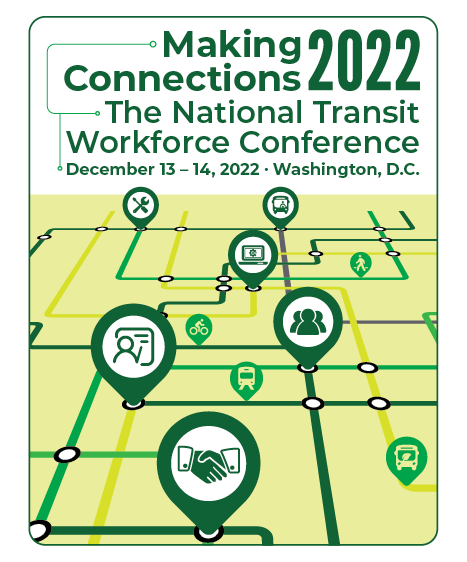
Making Connections 2022 – Conference Overview and Videos
The Transit Workforce Center hosted Making Connections 2022: The National Transit Workforce Conference in Washington, D.C. on December 13-14, 2022. This conference brought together participants from urban, suburban, rural, and tribal public transportation and industry stakeholders in plenaries, workshops, networking, and ongoing dialogue. Discussions and sessions featured topics including recruitment and retention, training, mentoring and apprenticeships, new technologies, and preparing today’s and tomorrow’s workforce.
Transit Workforce Center
December 2022
Session materials from Making Connections 2022 are hosted on the TWC Resource Center. Please click here to view all related materials. A PDF copy of the conference schedule is linked below.
Opening Video:
Recap Video:
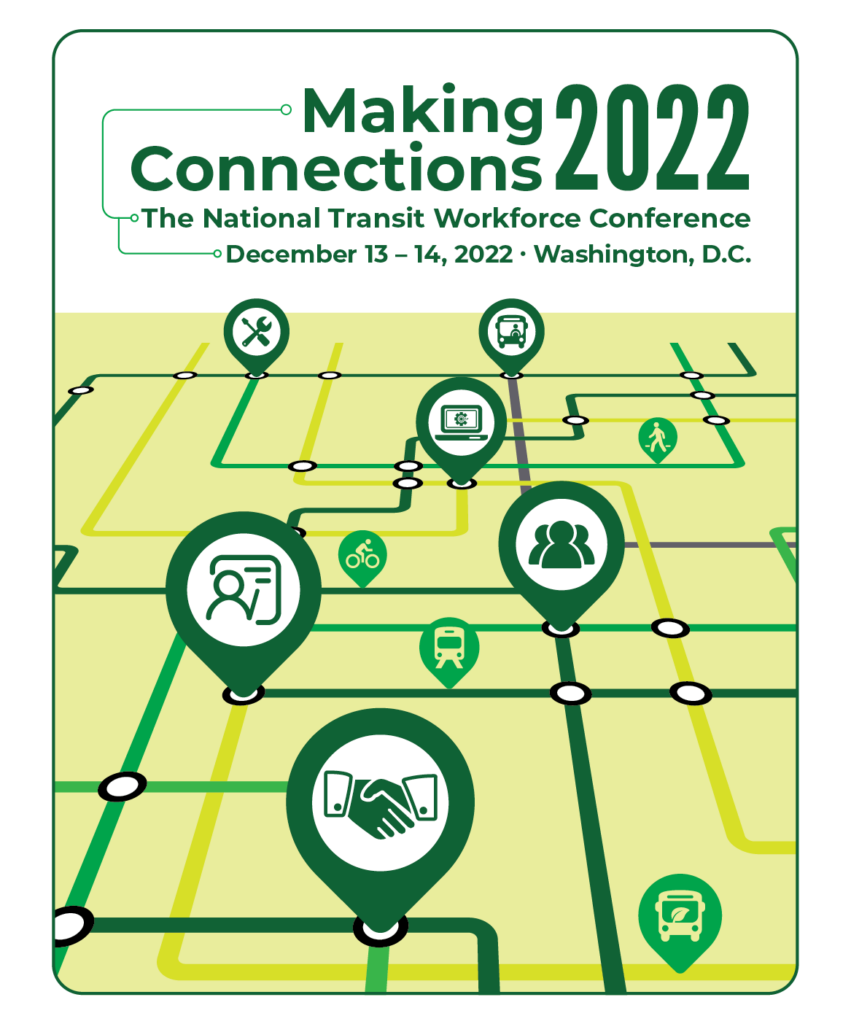
Making Connections 2022 – Engines to Inverters: Preparing Technicians for ZEB Deployment
This session about working with ZEB technologies was presented as part of TWC’s Making Connections 2022 transit workforce conference in December, 2022.
Transit Workforce Center
December 2022
Session Summary: As transit agencies integrate zero-emission technologies into their fleet, many are experiencing difficulties in preparing their frontline workforce to properly maintain and operate the equipment. In this workshop, panelists explored lessons learned, best practices, and available resources to upskill their technician and maintenance workforce and prepare the future frontline workers to safely and effectively work with ZEB technologies. Presentations by industry experts, early-adopters, and successful rollouts offered insight for an audience seeking guidance on first steps and follow-through.
Moderators
- James Hall: Program Manager, Technical Training – International Transportation Learning Center/Transit Workforce Center
- Lisa Jerram: Director of Bus Operations and New Vehicle Technologies – American Public Transportation Association
Speakers
- Joseph Gamez: Assistant Chief Maintenance Officer Maintenance Training – New York City Transit, Department of Buses
- Walter Kirkland: Service Manager – StarMetro Tallahassee
- Obed Mejia: Senior Bus Equipment Instructor – Los Angeles County Metropolitan Transportation Authority

Making Connections 2022 – Growing Your Own Through Apprenticeship: A Joint Approach to Building Skills
This session about apprenticeship was presented as part of TWC’s Making Connections 2022 transit workforce conference in December, 2022.
Transit Workforce Center
December 2022
Session Summary: Apprenticeship programs create a foundation for strong, effective workforce development programs. The ability to build and maintain these programs requires strong labor-management partnerships, or, in the case of nonunion agencies, ongoing involvement of, and management engagement with, the frontline workforce. In this session, panelists from transit agencies presented examples of challenges met and lessons learned as they designed and implemented their apprenticeship programs. Attendees heard how apprenticeship can support a variety of frontline transit occupations and the benefits that apprenticeship offers.
Moderator
- Jamaine “G” Gibson: Director of Apprenticeships and Workforce Development – Amalgamated Transit Union
Speakers
- Dexter Bishop: Elevator/Escalator Journeyman – Amalgamated Transit Union/Local 689
- Stephanie Deiger: Chief Human Resources Officer – Southeastern Pennsylvania Transportation Authority
- Brian Funk: Chief Operating Officer and Deputy General Manager – MetroTransit Minneapolis
- Michael Hanssen: Supervisor of Technical Skills Training – Washington Metropolitan Area Transit Authority
- Alec Johnson: Bus Operator Apprenticeship Coordinator – MetroTransit Minneapolis/Amalgamated Transit Union Local 1005

Making Connections 2022 – Hands-On Instructional Training for Transit Trainers
This session about hands-on instructional training was presented as part of TWC’s Making Connections 2022 transit workforce conference in December, 2022.
Transit Workforce Center
December 2022
Session Summary: Hands-on instructional training is a critical piece to any organization’s training program. This workshop addressed hands-on training and its importance, best practices, lessons learned, and how to create effective hands-on training. Workshop participants observed hands-on welding simulation. The goal of this session was for participants to leave with the knowledge and resources to make hands-on training impactful and meaningful!
Moderators
- Kristen Ribaudo: Instructional Systems Design Consultant – International Transportation Learning Center/Transit Workforce Center
- Grant Young: Instructional Systems Design Consultant – International Transportation Learning Center/Transit Workforce Center
Speakers
- Ed Hogan: Chief Welding Instructor – Southeastern Pennsylvania Transportation Authority
- Grace Kuka: Welding Instructor – Southeastern Pennsylvania Transportation Authority
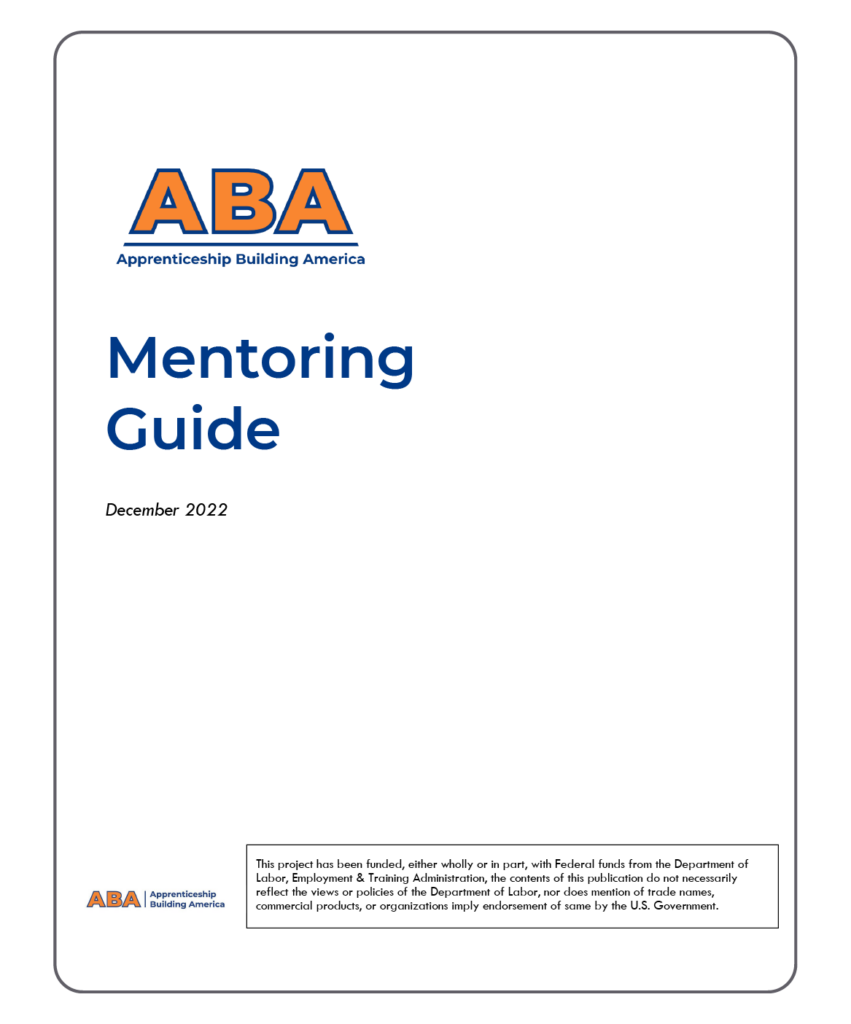
Apprenticeship Building America: Mentoring Guide
Mentoring is a key staple of a successful apprenticeship program. This guide provides an overview of the qualities of a good mentor, the activities a mentor undertakes, tips for mentoring youth apprentices, and more.
U.S. Dept of Labor, Apprenticeship Building America Grant Program
December 2022
TOPICS: Apprenticeship , Mentorship , Trainer and Mentor Development
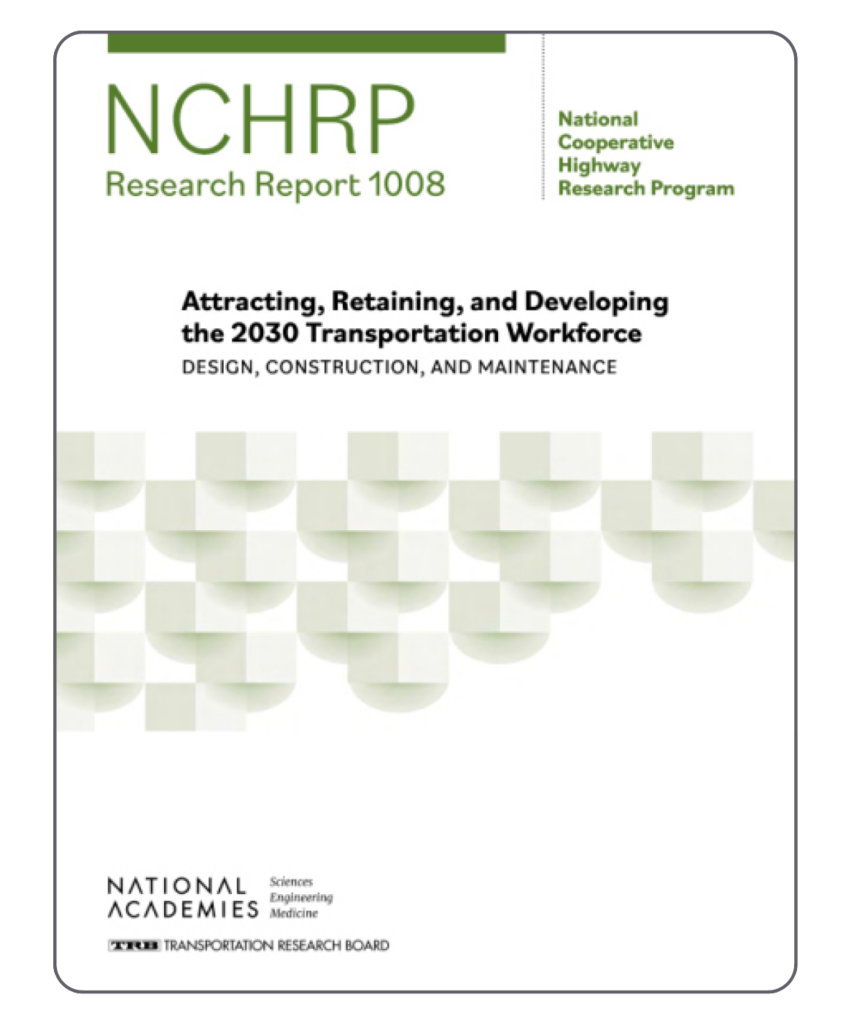
Attracting, Retaining, and Developing the 2030 Transportation Workforce
This report provides a guide with specific strategies and action plans to help agencies identify and address workforce needs through 2030 and beyond.
National Cooperative Highway Research Program
October 2022
State departments of transportation are responsible for providing a safe, efficient, and effective transportation system of infrastructure and services. To meet these responsibilities, transportation agencies need a highly skilled workforce with the expertise required to identify and address current transportation needs while also being prepared to address the challenges of the future.
Contributor(s): National Academies of Sciences, Engineering, and Medicine; Transportation Research Board; National Cooperative Highway Research Program; Candace Blair Cronin; Allison Alexander; Grace Arnold; Juan Carlos Batarse; Kelly Dray; Sasha Iliev; Jessica Jenkins; Erik Smallwood; Rachel Smart; Jake Streng; Mara Campbell; Susan Gallagher; Tyler Reeb; Tom O’Brien; Glenn McRae
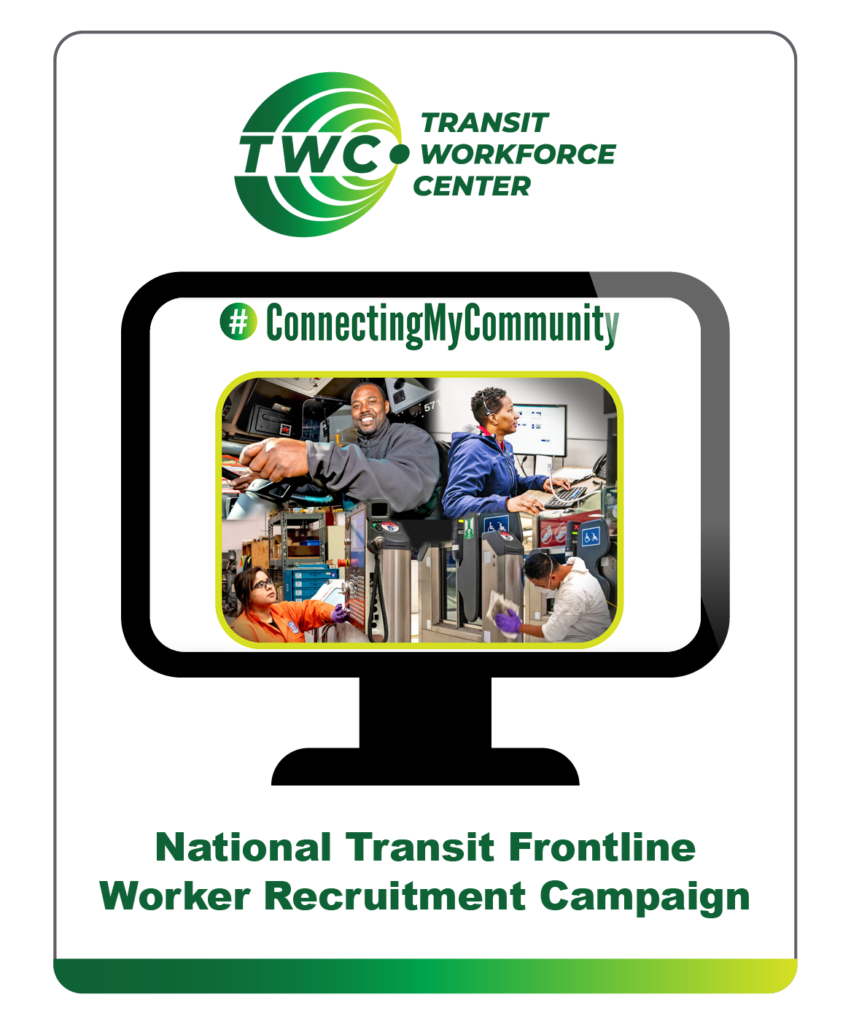
National Transit Frontline Worker Recruitment Campaign
Across the United States, whether large, small, urban, rural, or tribal, transit agencies are facing the challenge of recruiting and retaining drivers, mechanics, and technicians who can operate and maintain the buses of our public transit systems. To help support local transit efforts, TWC is developing the #ConnectingMyCommunity national frontline worker recruitment campaign, coordinated with the Federal Transit Administration (FTA) and industry, labor, and community partners from around the country.
Transit Workforce Center
July 2022
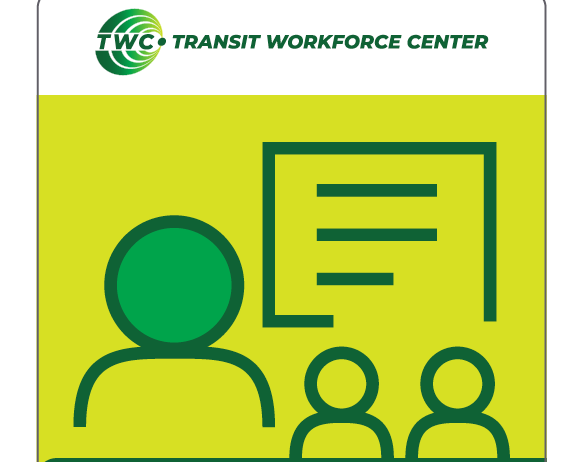
Train-the-Mentor
Transit Workforce Center
TOPICS: Mentorship , Trainer and Mentor Development , Training
This workshop is designed for employees or journeyworkers designated as mentors to support on-the-job learning for apprenticeship programs. The content includes a review of mentor roles, an introduction to learning styles, and a facilitated discussion about communication and problem solving. The second half of the workshop includes role playing exercises for the participants to practice what they learned. The instructor leads the participants through a structured review of that experience and review of the mentoring concepts presented. The program acknowledges the wisdom of the mentors and encourages them to view themselves as ambassadors for the apprenticeship and advocates for the apprentices.
Please follow the link below for additional details and to submit a mentor training request.
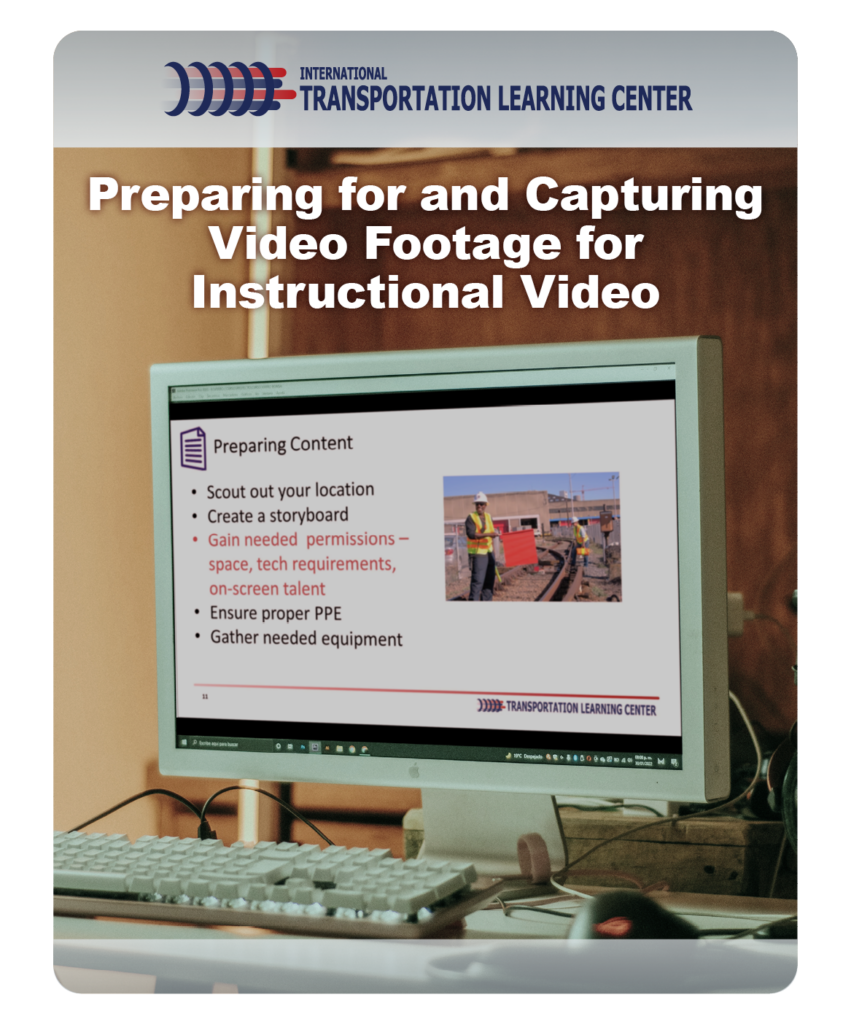
Preparing for and Capturing Video Footage for Instructional Video
International Transportation Learning Center
March 2021
TOPICS: Trainer and Mentor Development , Training
Digital and video instruction are two ways in which transit agencies can enhance their current training methods for their frontline employees. In a previous skill booster event, we showcased video editing software Filmora™. But before you can edit video, you need to capture it. As videography expert and the presenter of this session Kenyon Corbett says, “there is no replacement for good audio and video.”
This video uses real-world examples to demonstrate the Dos and Don’ts of capturing video and audio for instructional videos. It also outlines how best to prepare for this process.
This is one of several skill booster events held by the International Transportation Learning Center (ITLC). Other webinars can be found by filtering by resource type.
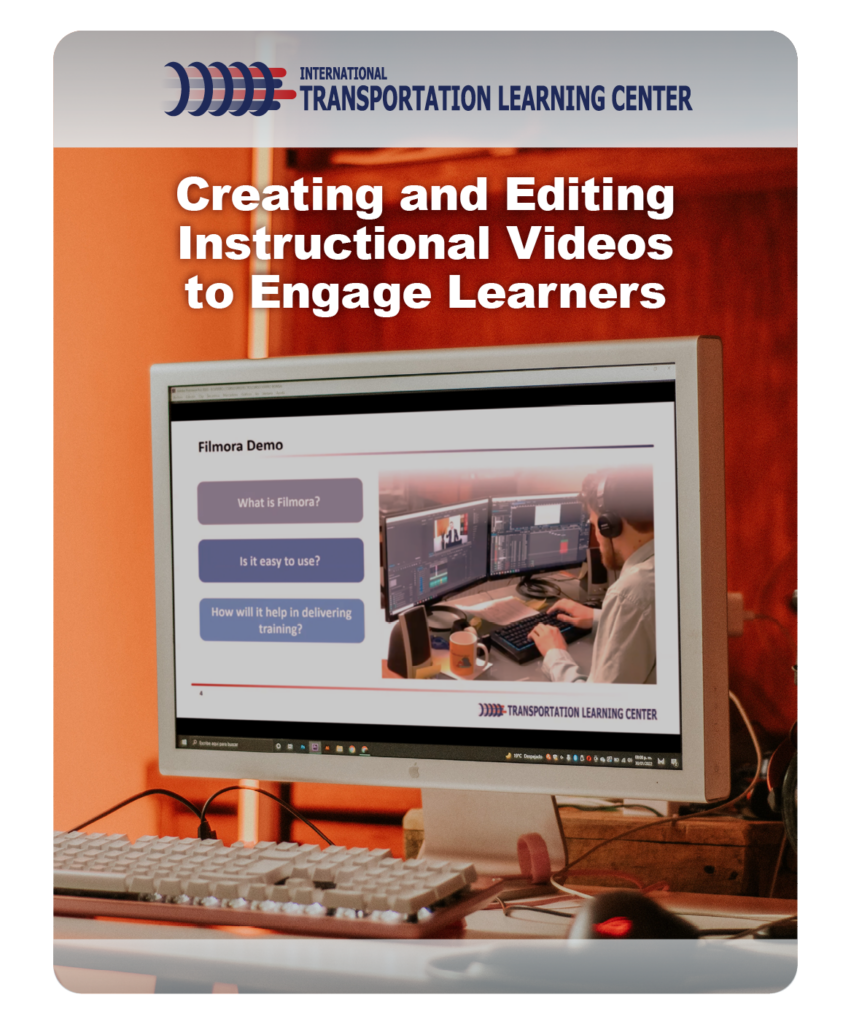
Creating and Editing Instructional Videos to Engage Learners
Beyond the traditional classroom environment, one way transit trainers can enhance delivery is through video instruction. This recorded webinar demonstrates Filmora™, an affordable and easy-to-use platform that helps you create video instruction modules.
This is one of several skill booster events held by the International Transportation Learning Center (ITLC).
International Transportation Learning Center
November 2020
TOPICS: Trainer and Mentor Development , Training
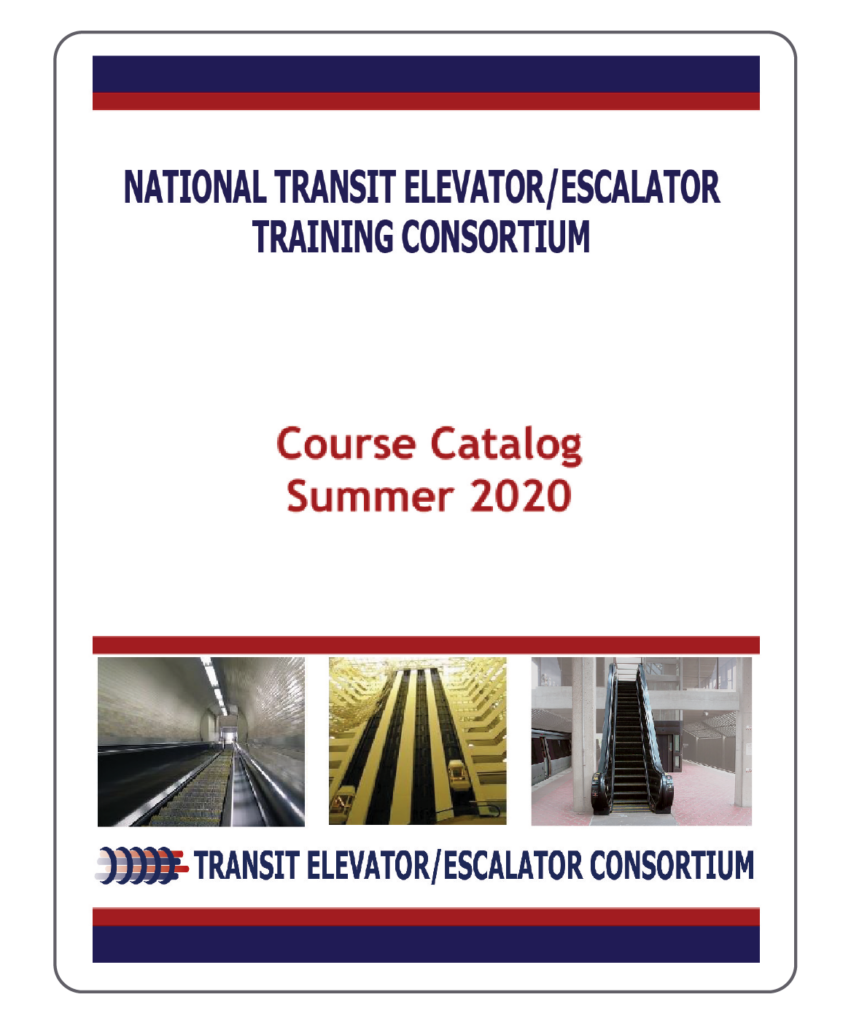
Elevator/Escalator Training Consortium
International Transportation Learning Center
The International Transportation Learning Center (ITLC) organizes multiple national training consortia to develop standards-based national training courseware for frontline occupations in public transportation organizations.
The Transit Elevator-Escalator Training Consortium (the Consortium) was the first in an ongoing series of industry-wide collaborative programs to develop integrated systems of training for key frontline occupations in public transportation. Building on national training standards developed by industry Subject Matter Experts (SMEs) from 2006 to 2010 and then adopted by the American Public Transportation Association (APTA), the Consortium developed a full set of standardized national courseware to support training and apprenticeship programs for transit elevator/escalator (El-Es) technicians. The curriculum and courseware development team was composed of subject matter experts (SMEs) from five member agencies and unions from across the country. Membership of the Consortium consists of transit systems that maintain their vertical transportation equipment in-house, rather than relying on outside contractors. Equipment manufacturers contributed access to their technical drawings and manuals to enrich the courseware.
The list of courseware as of Summer 2020 is contained in the attached catalog.
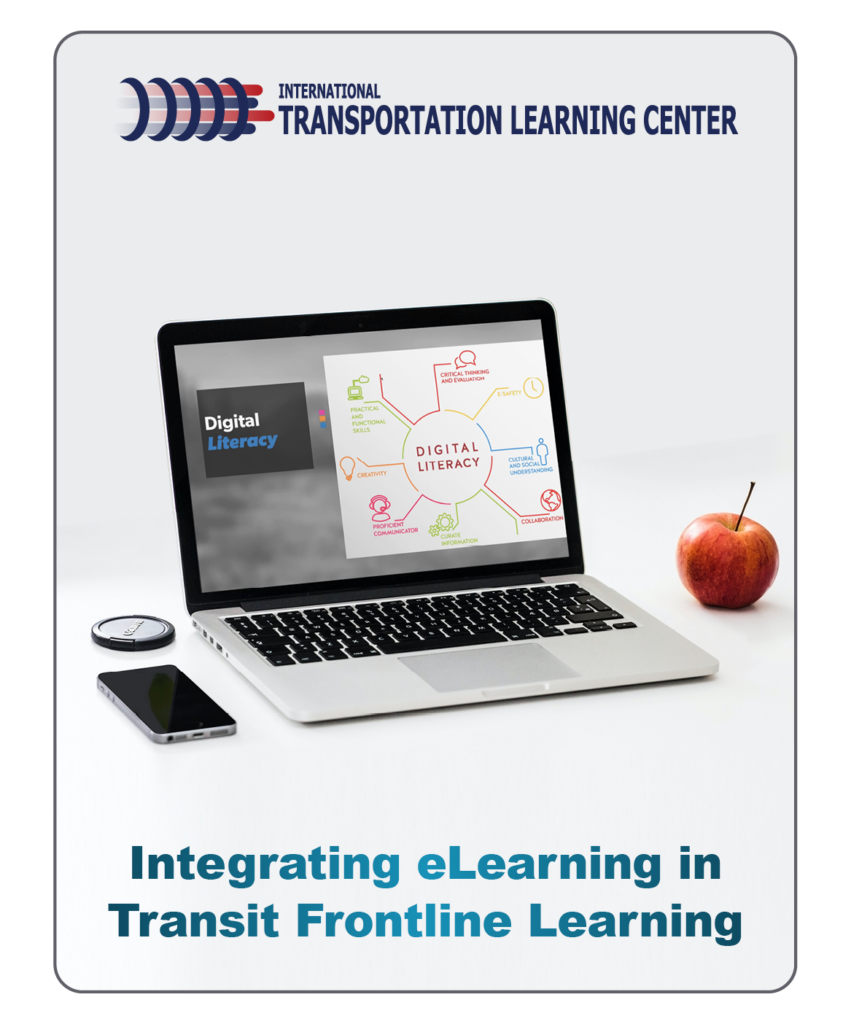
Integrating eLearning in Transit Frontline Learning
In this webinar, guest speaker Ron Thiele, Xpan Interactive, presented on ways in which some transit organizations use eLearning.
This is one of several skill booster events held by the International Transportation Learning Center (ITLC).
International Transportation Learning Center
May 2020
TOPICS: Trainer and Mentor Development , Training
Please see video below.
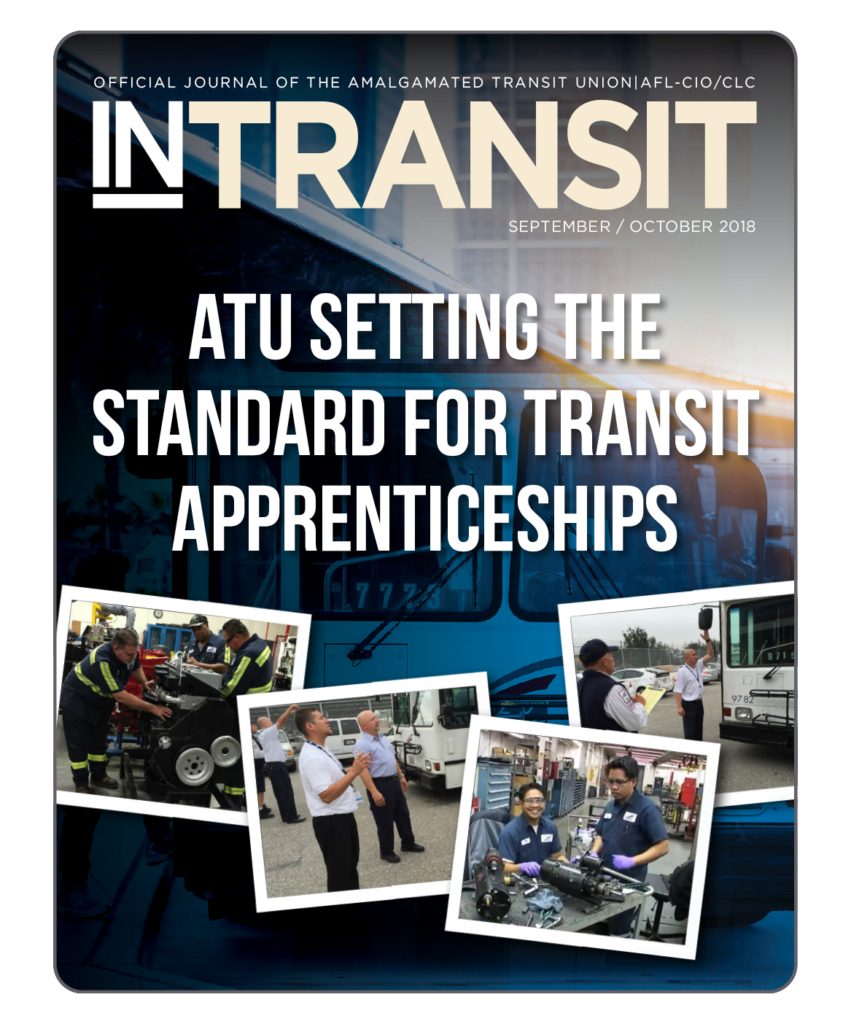
Setting the Standard for Transit Apprenticeships
This article in In Transit summarizes The Amalgamated Transit Union’s (ATU’s) and the International Transportation Learning Center’s (ITLC’s) efforts to promote apprenticeship program development. It discusses apprenticeship programs at several transit agencies and ATU locals, as well as the role of mentorship in a successful apprenticeship program.
Amalgamated Transit Union
September 2018
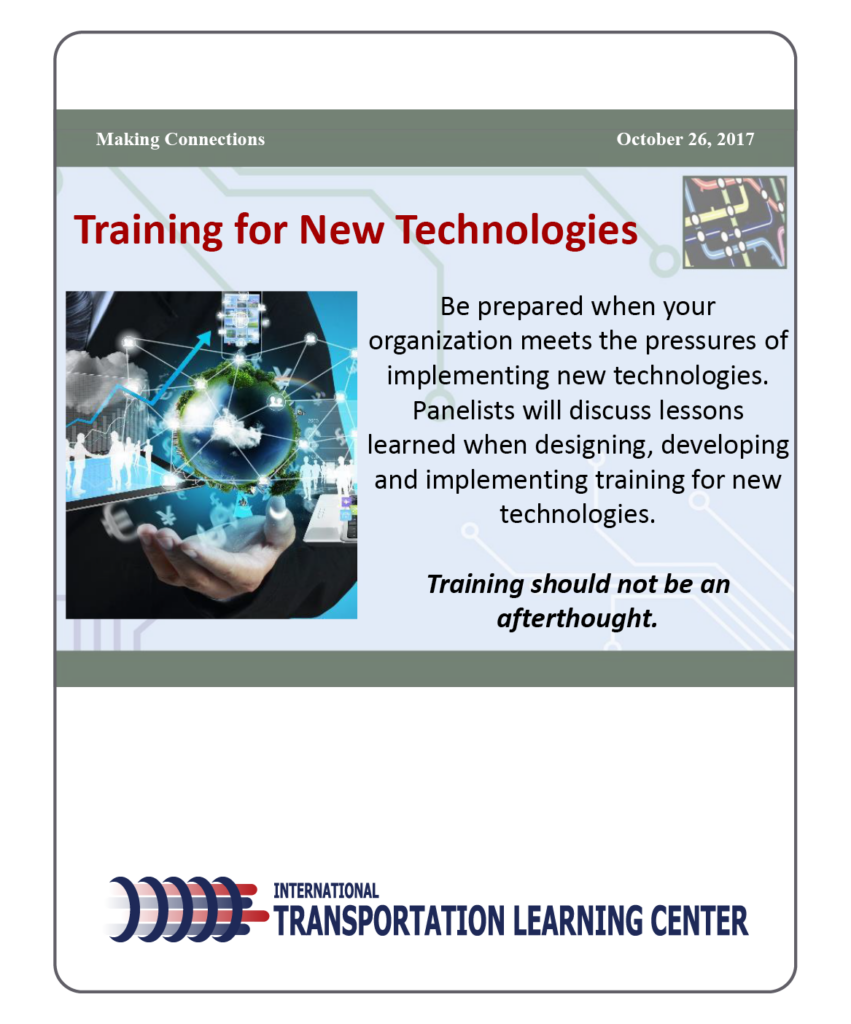
Training for New Technologies Workshop
This slide presentation is from the “Training for New Technologies” workshop held during the International Transportation Learning Center’s Making Connections conference held on October 26, 2017.
International Transportation Learning Center
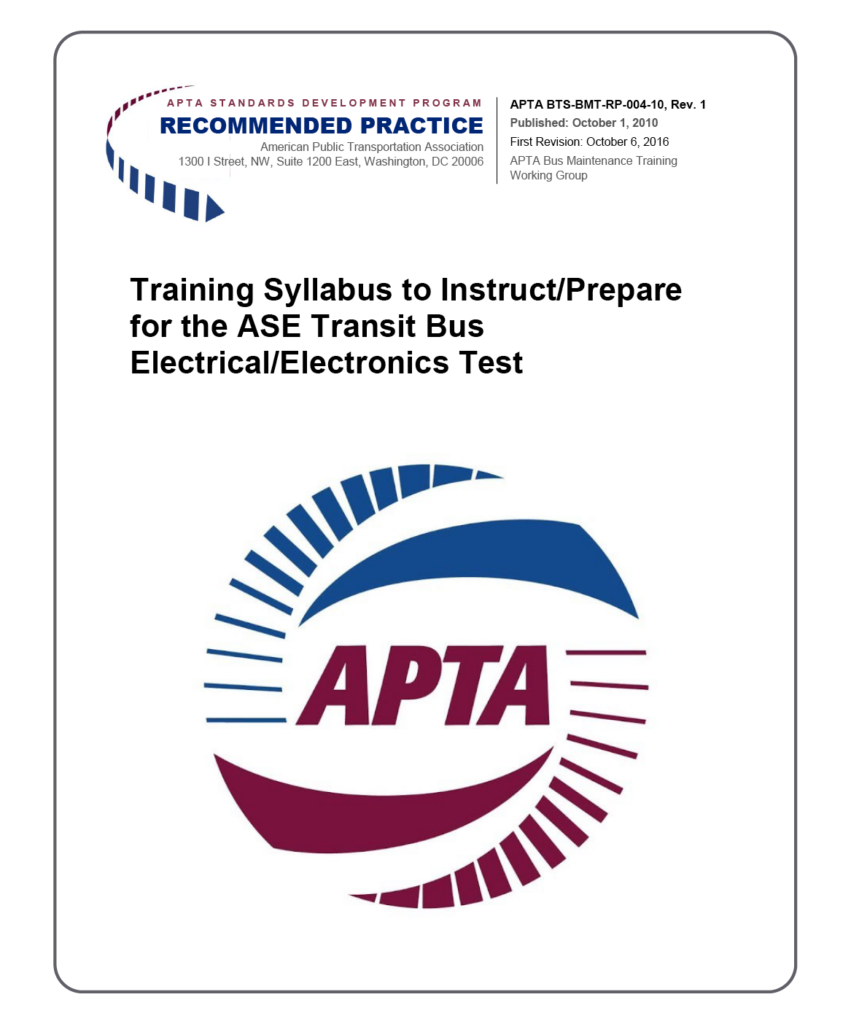
Training Syllabus to Instruct/Prepare for the ASE Transit Bus Electrical/Electronics Test
This Recommended Practice provides guidelines for establishing a standardized bus maintenance training related to the ASE certification program syllabus for the electrical/electronics systems used in transit buses and coaches.
American Public Transportation Association
October 2016
TOPICS: Trainer and Mentor Development , Training
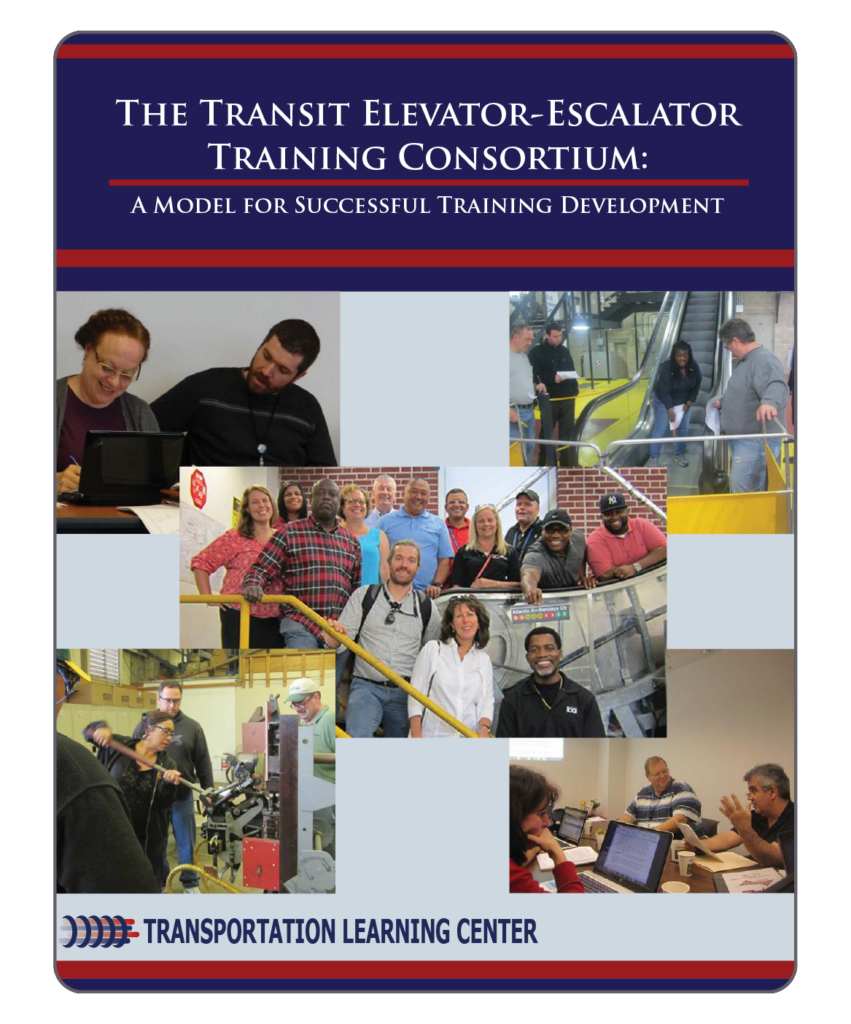
The Transit Elevator-Escalator Training Consortium: A Model for Successful Training Development
A report on the process, products and outcomes related to the first National consortium for development of training for public transportation maintenance employees. This joint labor-management effort set a proven model for multiple other similar consortia. Products include – instruction ready courseware, a nationally recognized apprenticeship program for transit maintenance elevator/escalator maintainers and train-the-trainer program.
International Transportation Learning Center
September 2016
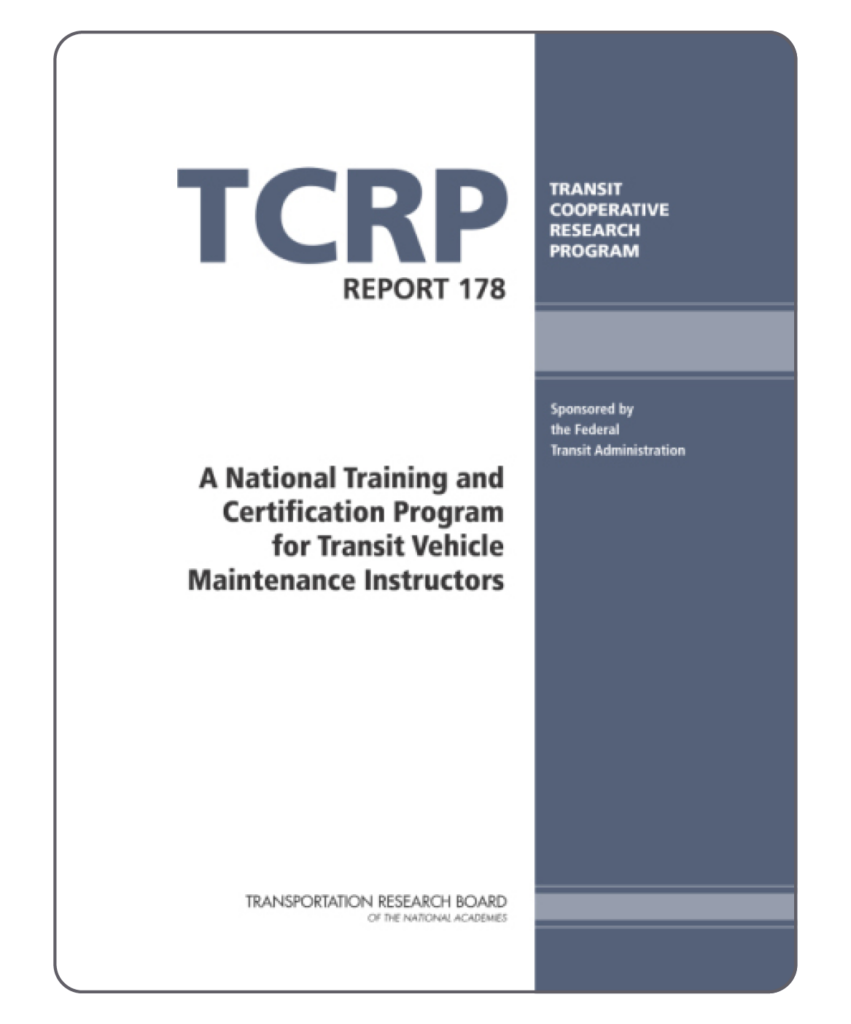
A National Training and Certification Program for Transit Vehicle Maintenance Instructors
This TCRP report provides a proposed national program structure and plan for training and certifying transit bus and rail maintenance instructors. The report also provides best practices used in the public and private sectors to prepare and certify technical instructors, as well as the attributes and instructional delivery methods found most effective for maintenance instructors.
Transit Cooperative Research Program
January 2015
TOPICS: Trainer and Mentor Development , Training
Contributor(s): National Academies of Sciences, Engineering, and Medicine; Transportation Research Board; Transit Cooperative Research Program Synthesis Program; Transit Cooperative Research Program; Transportation Learning Center; Educational Data Systems Inc
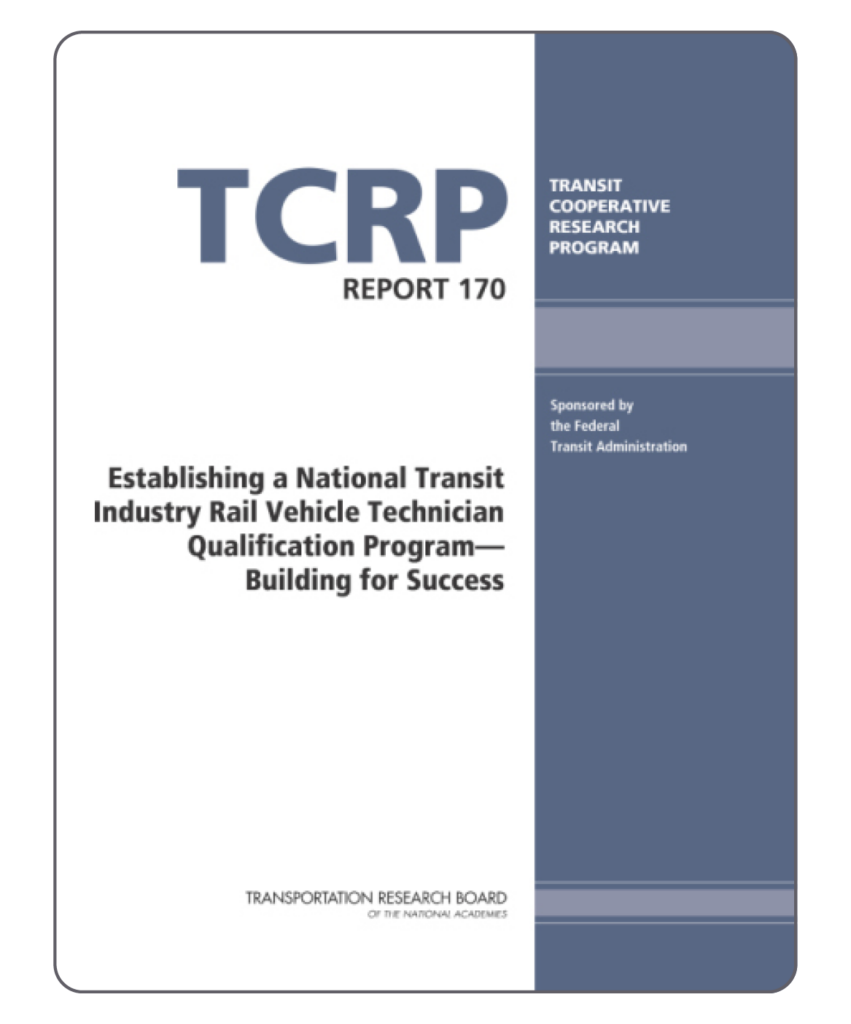
Establishing a National Transit Industry Rail Vehicle Technician Qualification Program—Building for Success
TRB’s Transit Cooperative Research Program (TCRP) Report 170: Establishing a National Transit Industry Rail Vehicle Technician Qualification Program—Building for Success describes a system of qualification that has been developed for rail vehicle technicians. This qualification system is available for implementation through the Transportation Learning Center.
The program integrates national training standards, progressive classroom curricula and introductory courseware, on-the-job learning modules, an apprenticeship framework that combines well-designed sequences of learning, mentoring to support learners, and coordination of classroom and on-the-job learning. The qualification system also includes written and hands-on certification assessments to confirm that technicians have the practical knowledge and skills required to perform their jobs at the highest level of expertise.
Transit Cooperative Research Program (TCRP) & International Transportation Learning Center
January 2014
TOPICS: Career Pathways , Mentorship , Trainer and Mentor Development , Training
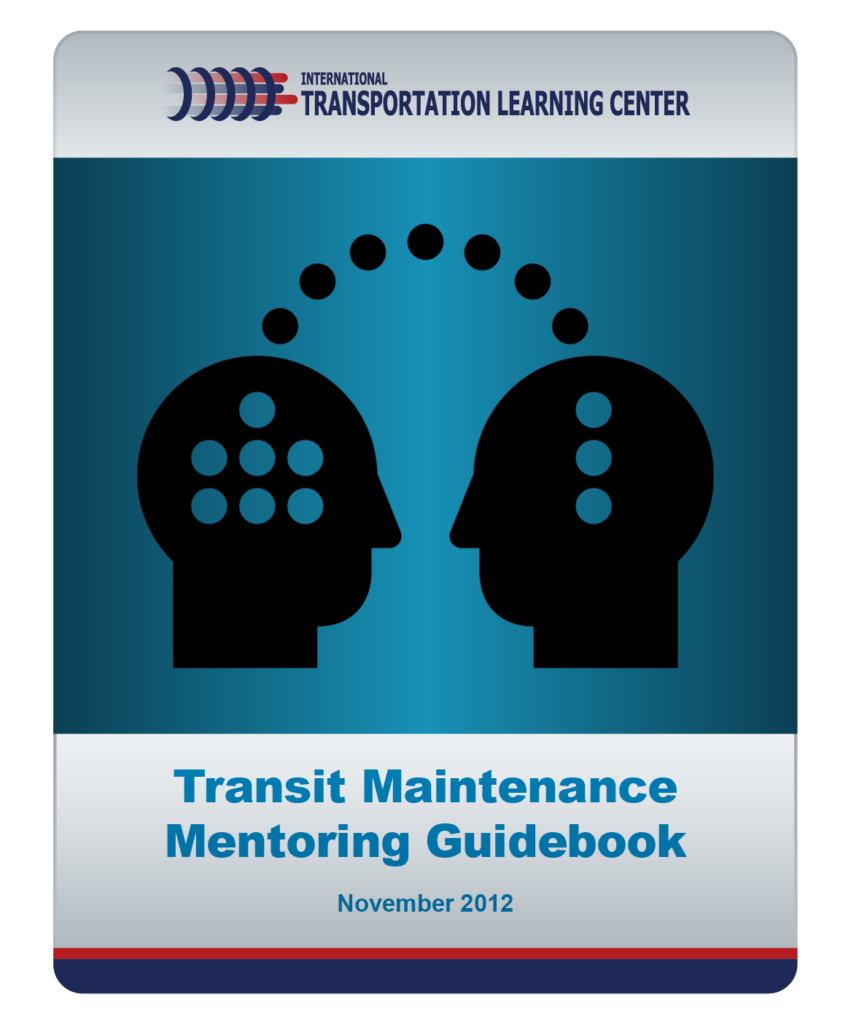
Transit Maintenance Mentoring Guidebook
The purpose of this report is to serve as a guidebook, offering information that transit agencies can use to establish mentoring as a training method with guidance, suggestions, and examples to implement or expand upon existing mentoring programs. It is based on a generic mentoring guidebook developed by the USDOT, modified and enhanced to reflect transit maintenance applications.
International Transportation Learning Center
November 2012
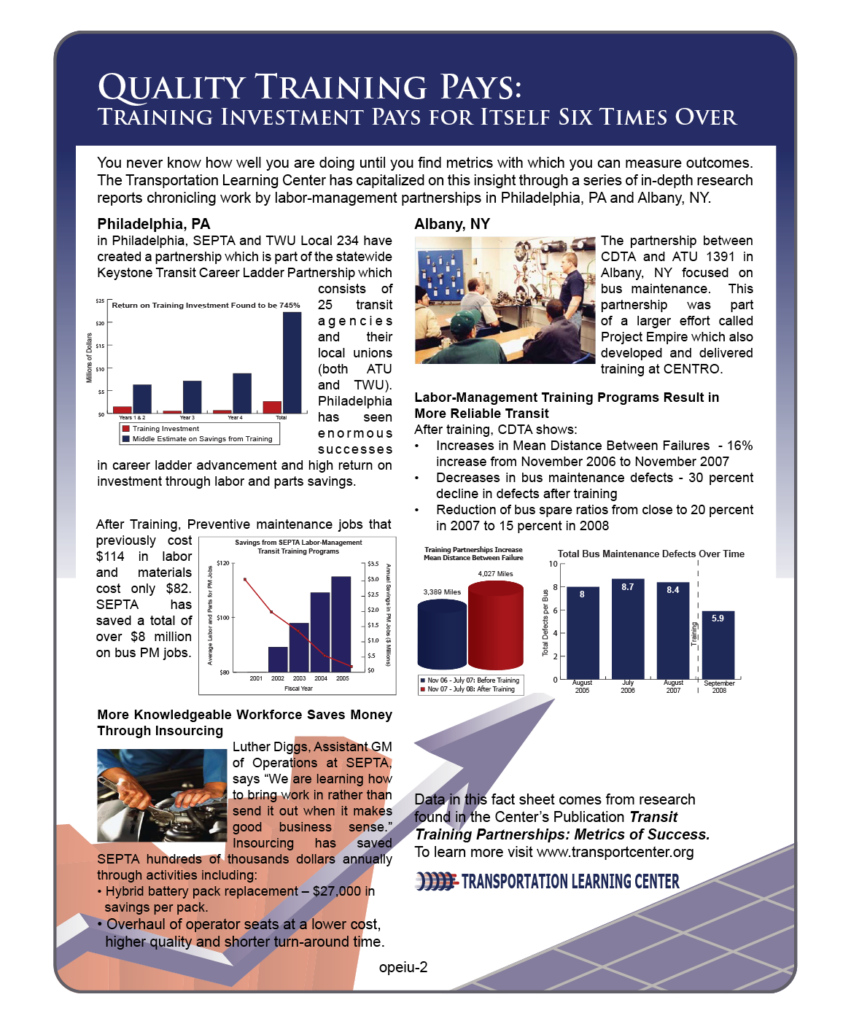
Quality Training Pays: Training Investment Pays for Itself Six Times Over
You never know how well you are doing until you find metrics with which you can measure outcomes. The Transportation Learning Center has capitalized on this insight through a series of in-depth research reports chronicling work by labor-management partnerships in Philadelphia, PA and Albany, NY. This fact sheet outlines these findings and shows a substantial return on training investment.
International Transportation Learning Center
June 2011
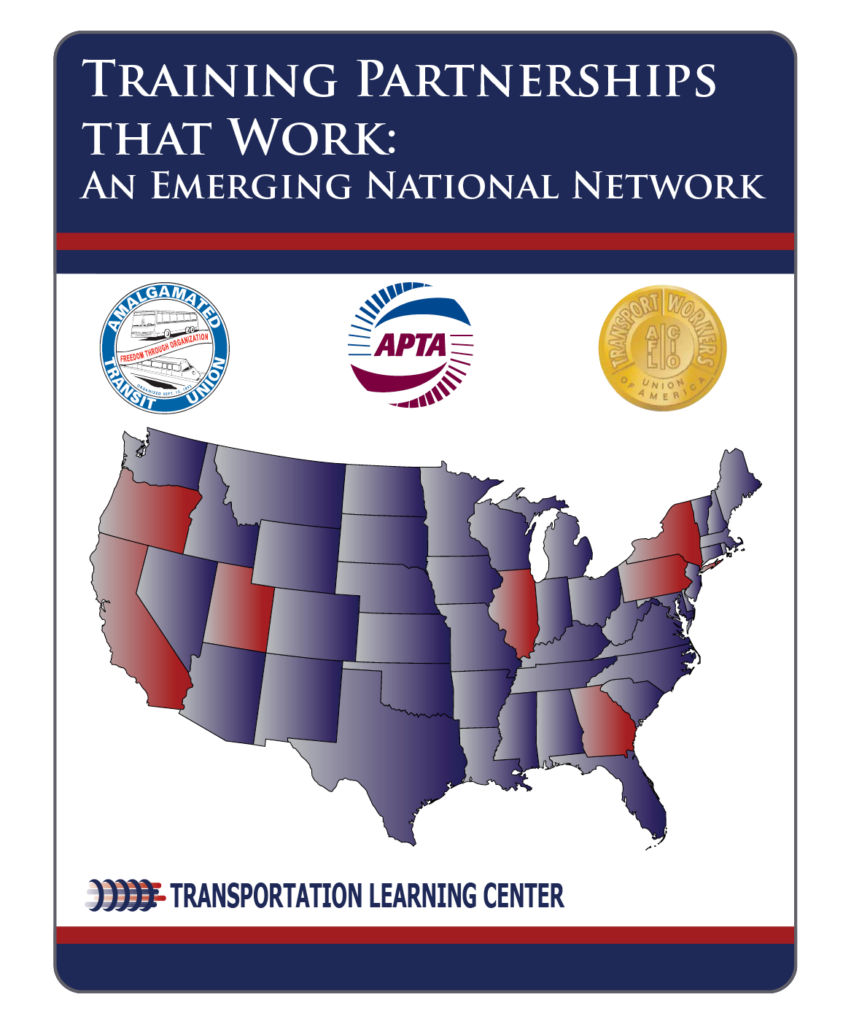
Training Partnerships That Work: An Emerging National Network
Training Partnerships That Work provides vivid summaries of successful labor-management training partnerships at sites across the country. The cases included here represent unique training partnerships. Most importantly, they illustrate how labor and management can work together successfully on issues of training, and provide valuable lessons for other industries facing the problem of retiring baby boomers and inadequate capacity to train replacement workers.
International Transportation Learning Center
February 2010
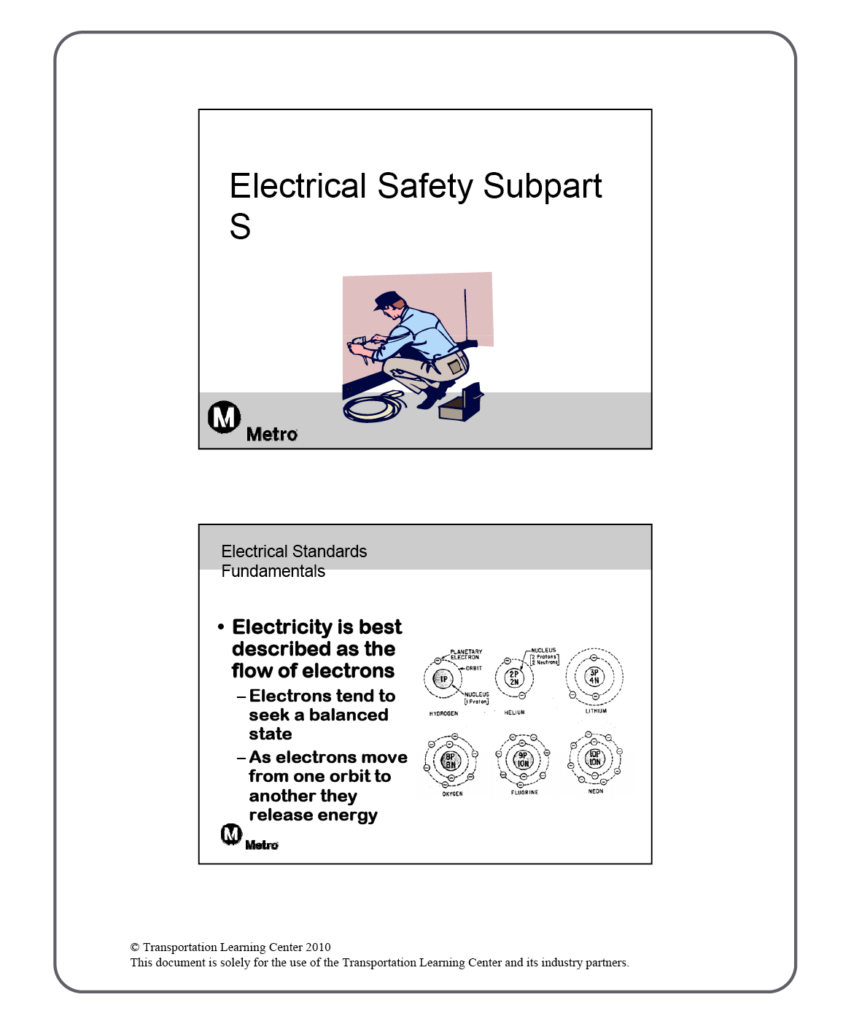
Electrical Standards Fundamentals
A document of electrical safety standards and fundamentals. The fundamentals include Electrons, Static Electricity, and Magnetic fields. It also covers how power is transmitted to buildings through the power grid and how grounding is built into delivery systems. This resource is intended only to provide an overview of fundamental principles – please see Terms & Conditions.
International Transportation Learning Center
January 2010
TOPICS: Safety and Health , Trainer and Mentor Development , Training
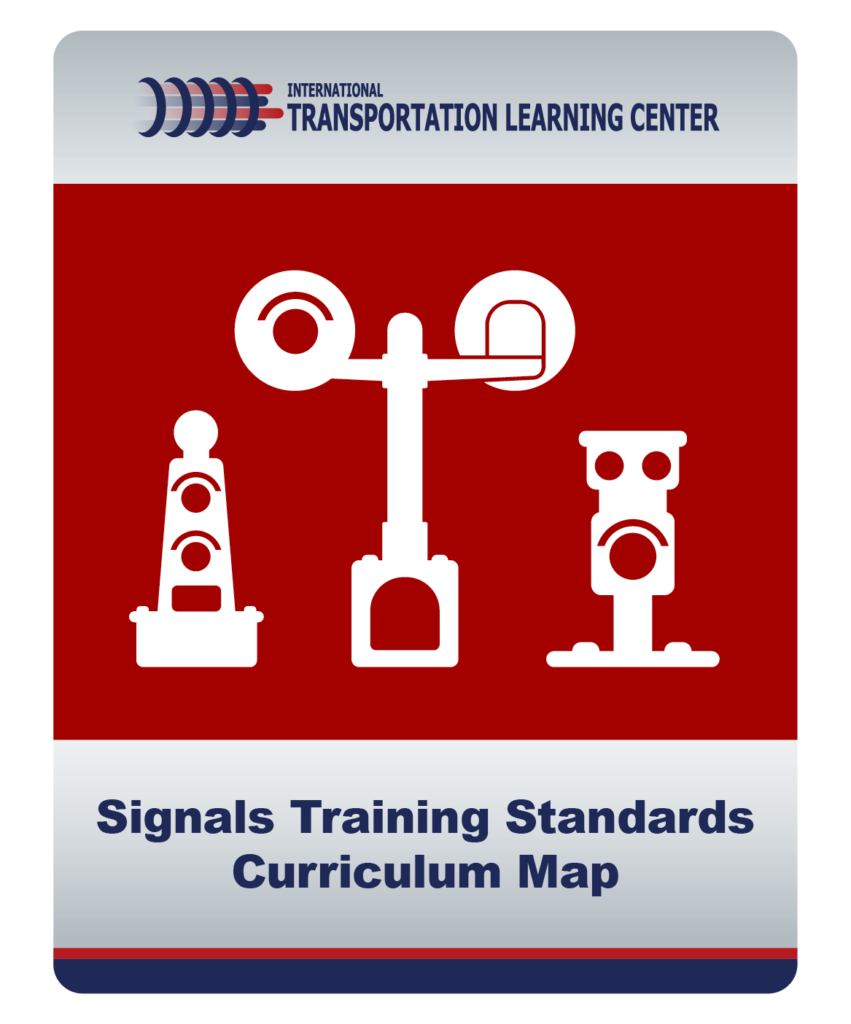
Signals Training Standards Curriculum Map
A curriculum map of the Signals Training Standards released on January 22, 2008.
International Transportation Learning Center
January 2008
TOPICS: Safety and Health , Trainer and Mentor Development , Training
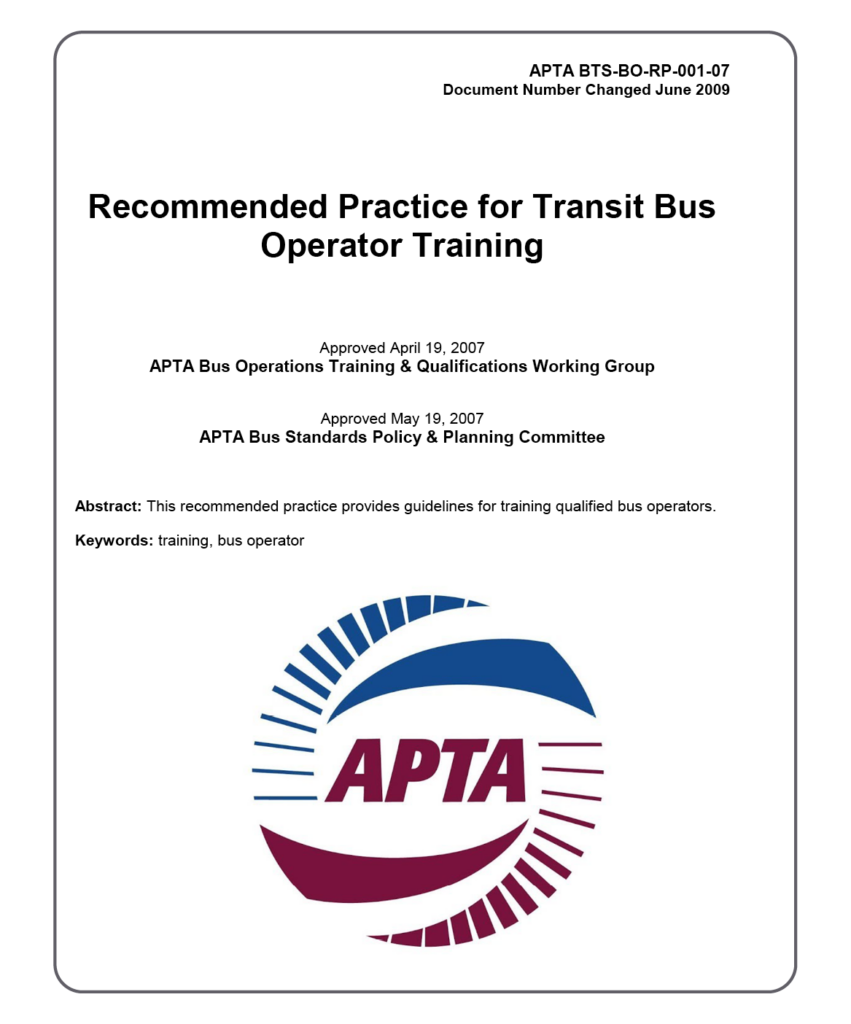
APTA Recommended Practice for Transit Bus Operator Training
This recommended practice provides guidance for standardized transit operator training to assist in the development of professional bus operators resulting in quality service. Individual operating agencies can modify these guidelines to accommodate their specific training goals and operating modes.
American Public Transportation Association (APTA)
May 2007
TOPICS: Safety and Health , Trainer and Mentor Development , Training
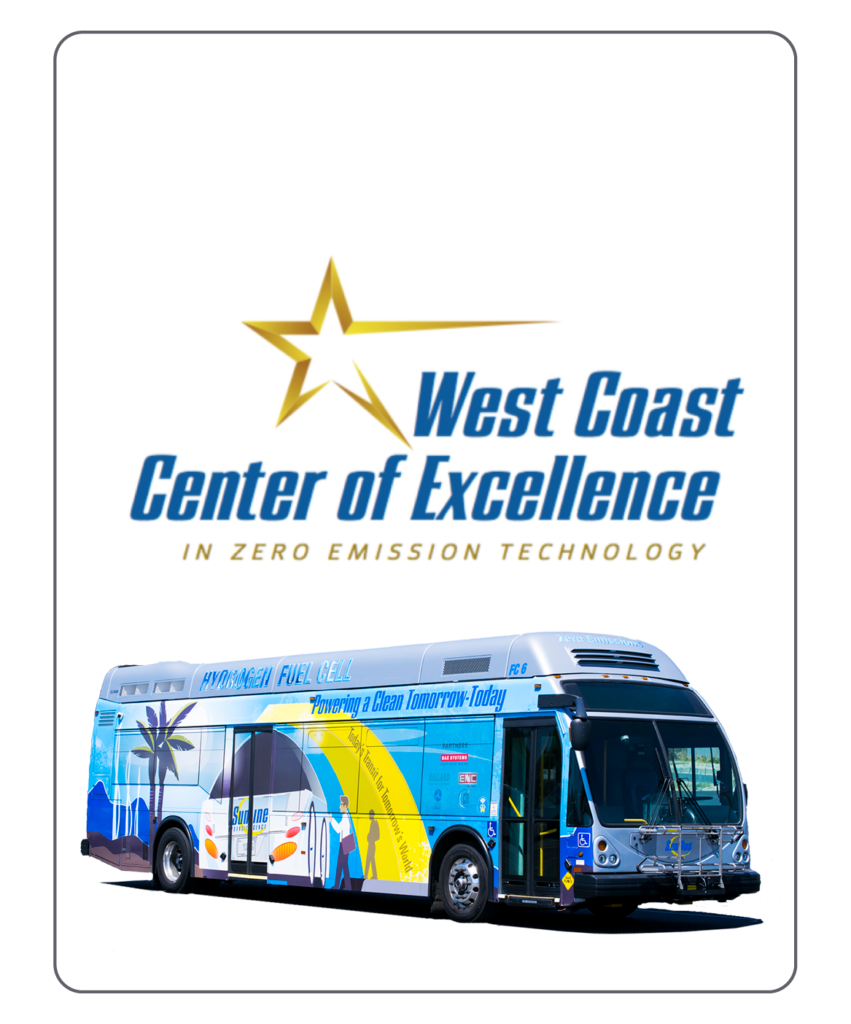
West Coast Center of Excellence in Zero Emission Technology
SunLine Transit Agency’s West Coast Center of Excellence in Zero Emission Technology (WCCOE) is a workforce development program focused on deploying and operating zero emission buses in public fleets. Funded by the FTA, this center provide training, best practice information and access to technology and software geared towards the planning, procurement and deployment of zero emission buses.
SunLine Transit Agency
TOPICS: Low-No , Trainer and Mentor Development , Training
Course offerings include:
• Leadership and Employee Relations
• Zero Emission Bus Overview
• Zero Emission Bus Operations
• Zero Emission Bus Maintenance
• Financial Management
• Zero Emission Bus Procurement
• Zero Emission Bus Policies and Regulations
• Planning for ZEB Operation
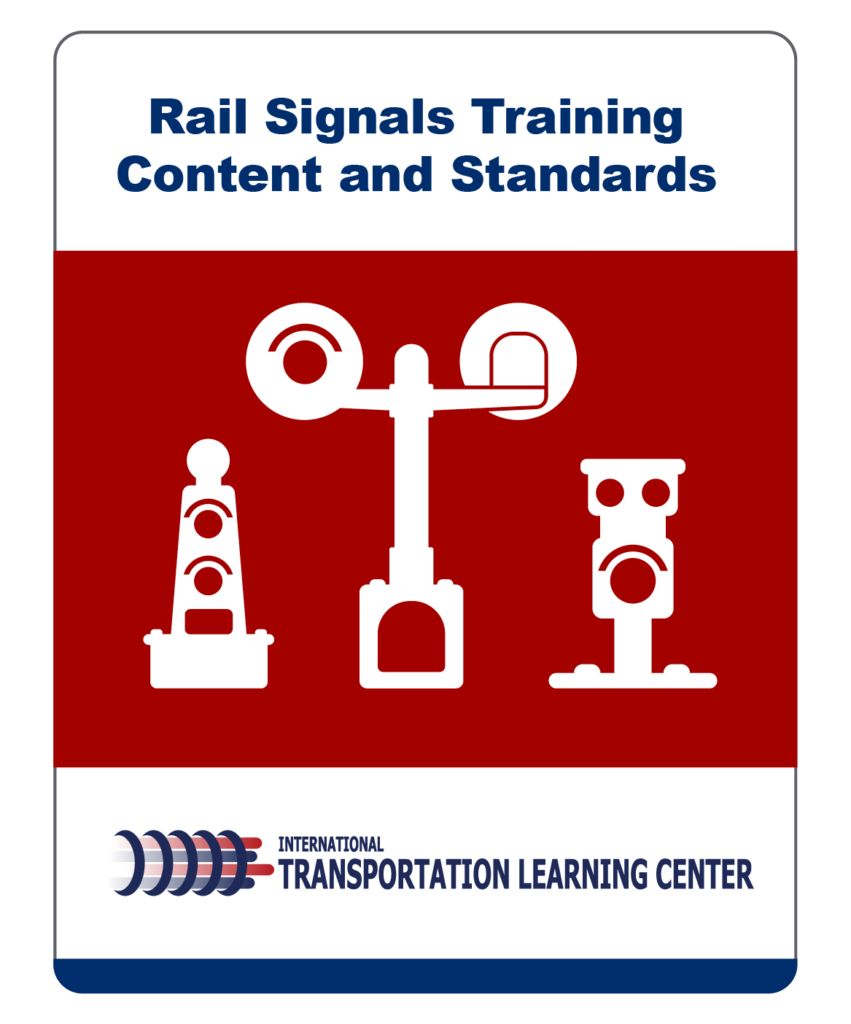
Rail Signals Training Content and Standards
An overview of ITLC’s signals training course (2 modules—level 100 and 200).








